电子信息专业英语
《电子信息类专业英语(第二版)第一课

O ptic a l detector
E lectrical re c e i ve r
O ptical fiber com m unication system
D e stina tion
(b)
Figure 1.1 (a) The general communication system; (b) The optical fiber communication system
signal processing is usually performed electrically.
Unit One Optical Fiber Communication
Information source
Transmitter (modulator)
Transmission medium
Communication system
transmission is continued down the ห้องสมุดไป่ตู้ink.
Unit One Optical Fiber Communication
For optical fiber communications system shown in Figure1.1(a) may be considered in slightly greater detail, as given in Figure1.1(b). In this case the information source provides an electrical signal to a transmitter comprising an electrical stage which drives an optical source to give modulation of the lightwave carrier. The optical source which provides the electrical-optical conversion may be either a semiconductor laser or light emitting diode (LED). The transmission medium consists of an optical fiber cable and the receiver consists of an optical detector which drives a further electrical stage and hence provides demodulation of the optical carrier. Photodiodes (p-n, p-i-n or avalanche) and, in some instances, phototransistors and photoconductors are utilized for the detection of the optical signal and the optical-electrical conversion. Thus there is a requirement for electrical interfacing at either end of the optical link and at present the
电子信息专业英语正式版

The Translation
原句
3、The frequency of a waveform can be determined by counting the number of centimeters, horizontally, in one cycle of the waveform and then multiplying it by the setting time/cm control.
4、For example, if the waveform is 2 cm long and the control is set at 1 ms/cm, the period would be 2 ms. The frequency can now be found from the formula: f=1/T=1/2 ms=500Hz.
重点词汇 frequency ['frikwənsi] n. 频率;频繁 centimeter ['sɛntə,mitɚ] n. [计量] 厘米;[计量] 公分 horizontally [,hɑrə'zɑntli] adv. 水平地;地平地 multiplying ['mʌltɪplaɪɪŋ] adj. 乘法的v. 乘;繁殖;增加
示波器是最重要的电子测试仪器之一。
The Translation
原句
2、It is widely used in the electronic industry for research and development, design work, trouble shooting and signal monitoring, manufacturing and production line testing, and many other applications where the observation of an electrical waveform is desired.
第4章电电子信息类专业英语(第二版)_李白萍
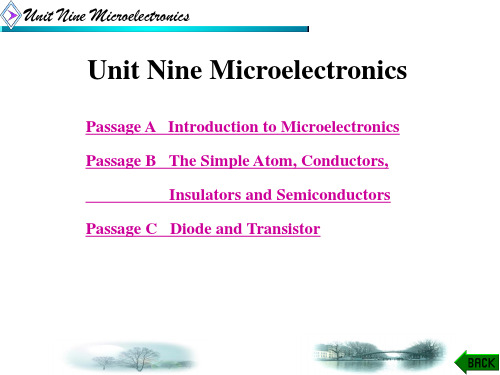
Unit Nine Microelectronics
Passage A Introduction to Microelectronics Passage B The Simple Atom, Conductors, Insulators and Semiconductors Passage C Diode and Transistor
Unit Nine Microelectronics
FET (Field effect transistors)场效应管 impedance 阻抗 dissipation 损耗 extractive 抽出; 释放出 fabrication 制造, 装配; 捏造事实 bias 偏差; 偏置 capacitor 电容 inductive 电感 dispense 分配 lumped element 集总元件 transistor 晶体管
Unit Nine Microelectronics
Most electronic circuits are composed of active devices, e.g. transistors and diodes, together with resistors (for bias, collector load, impedance transformation, etc.) and capacitors (e.g. for coupling ac signals while blocking dc supplies). Each of these elements can be produced in a form suitable for integrated circuit inclusion within limitations, e.g. capacitance values must not be too large. Some elements are difficult to produce in a suitable form, e.g. inductive elements, or large capacitors. Usually some alternative circuit form can be devised that dispenses with the requirement. Otherwise they must be included as an external lumped element.
电子信息类专业英语(西电第二版)Unit 4 Microel
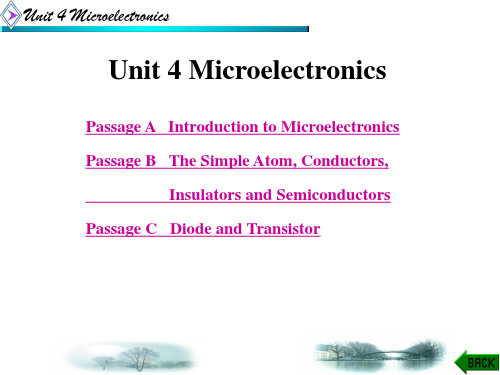
Unit 4 Microelectronics
Integrated circuits are small, light, rugged, and reliable. They require less power and lower voltages than equivalent macroscopic circuits; consequently they operate at lower temperatures, and individual components may be close together without exceeding the operating temperature limit. Relatively little stray capacitance and short time delays are produced because of the short interconnections between the individual components in IC. Maintenance is simplified because if a component of the IC fails the complete IC is usually replaced. Mass production techniques of plane technology have reduced the cost of many IC so that they are almost as inexpensive as a single transistor. Eventually most conventional circuits will be replaced by IC.
[2] The reduction in power dissipation is particularly important where a complex circuit is to be concentrated into a small space. The problem of extracting the heat generated in the circuit may then be a difficult one.
电子信息专业英语
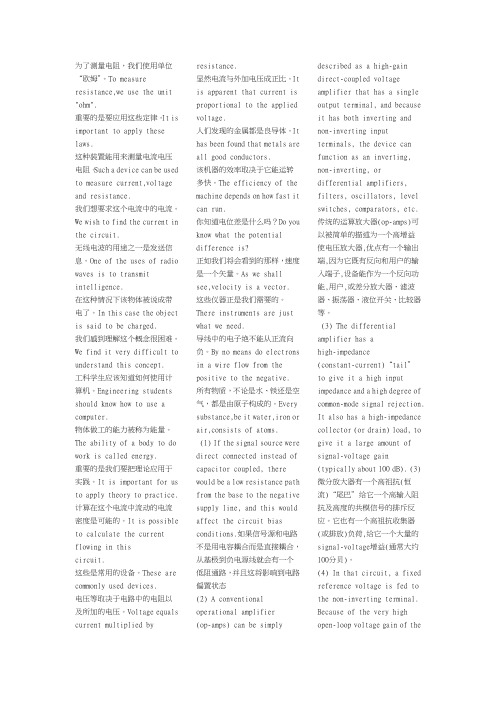
为了测量电阻,我们使用单位“欧姆”。
To measure resistance,we use the unit "ohm".重要的是要应用这些定律。
It is important to apply these laws. 这种装置能用来测量电流电压电阻。
Such a device can be used to measurecurrent,voltage and resistance. 我们想要求这个电流中的电流。
We wish to find the current in the circuit.无线电波的用途之一是发送信息。
One of the uses of radio waves is to transmit intelligence.在这种情况下该物体被说成带电了。
In this case the object is said to be charged.我们感到理解这个概念很困难。
We find it very difficult to understand this concept.工科学生应该知道如何使用计算机。
Engineering studentsshould know how to use acomputer.物体做工的能力被称为能量。
The ability of a body to do workis called energy.重要的是我们要把理论应用于实践。
It is important for us toapply theory to practice.计算在这个电流中流动的电流密度是可能的。
It is possible tocalculate the current flowing inthis circuit.这些是常用的设备。
These arecommonly used devices.电压等取决于电路中的电阻以及所加的电压。
Voltage equalscurrent multiplied byresistance.显然电流与外加电压成正比。
电子信息类专业英语unit 11 Database

·rest with意思为“取决于,属于…的权 限”,它在由since引导的原因状语从句中作 谓语。
[3] A non-management employee would probably have no access privileges to the payroll data and could neither inquire about nor change the data.
• The portion of a playing field having specific dimensions on which the action of a game takes place. 比赛场地
2023/3/13
《电子信息工程专业英语教程》
15
Field in dictionary
Unit 11 Database 数据库 (p137)
Passage A Database: A Better Way to Manage and Organize Data
Passage B DBMS and Data Independence, Integrity,Security
Passage C Database System and Three Data Models
2023/3/13
《电子信息工程专业英语教程》
21
Approach in text
In a traditional approach using COBOL programs, each individual COBOL application program that used that particular field would have to be changed, recompiled, and retested. COBOL语言编程的习惯方法是:每个独 立的使用了这种字段的COBOL应用程序 都要修改、重新编译并检测。来自field in text
电子信息工程专业英语词汇(精华整理版)

transistor n 晶体管diode n 二极管semiconductor n 半导体resistor n 电阻器capacitor n 电容器alternating adj 交互的amplifier n 扩音器,放大器integrated circuit 集成电路linear time invariant systems 线性时不变系统voltage n 电压,伏特数Condenser=capacitor n 电容器dielectric n 绝缘体;电解质electromagnetic adj 电磁的adj 非传导性的deflection n偏斜;偏转;偏差linear device 线性器件the insulation resistance 绝缘电阻anode n 阳极,正极cathode n 阴极breakdown n 故障;崩溃terminal n 终点站;终端,接线端emitter n 发射器collect v 收集,集聚,集中insulator n 绝缘体,绝热器oscilloscope n 示波镜;示波器gain n 增益,放大倍数forward biased 正向偏置reverse biased 反向偏置P-N junction PN结MOS(metal-oxide semiconductor)金属氧化物半导体enhancement and exhausted 增强型和耗尽型integrated circuits 集成电路analog n 模拟digital adj 数字的,数位的horizontal adj, 水平的,地平线的vertical adj 垂直的,顶点的amplitude n 振幅,广阔,丰富multimeter n 万用表frequency n 频率,周率the cathode-ray tube 阴极射线管dual-trace oscilloscope 双踪示波器signal generating device 信号发生器peak-to-peak output voltage 输出电压峰峰值sine wave 正弦波triangle wave 三角波square wave 方波amplifier 放大器,扩音器oscillator n 振荡器feedback n 反馈,回应phase n 相,阶段,状态filter n 滤波器,过滤器rectifier n整流器;纠正者band-stop filter 带阻滤波器band-pass filter 带通滤波器decimal adj 十进制的,小数的hexadecimal adj/n十六进制的binary adj 二进制的;二元的octal adj 八进制的domain n 域;领域code n代码,密码,编码v编码the Fourier transform 傅里叶变换Fast Fourier Transform 快速傅里叶变换microcontroller n 微处理器;微控制器assembly language instrucions n 汇编语言指令chip n 芯片,碎片modular adj 模块化的;模数的sensor n 传感器plug vt堵,塞,插上n塞子,插头,插销coaxial adj 同轴的,共轴的fiber n 光纤relay contact 继电接触器Artificial Intelligence 人工智能Perceptive Systems 感知系统neural network 神经网络fuzzy logic 模糊逻辑intelligent agent 智能代理electromagnetic adj 电磁的coaxial adj 同轴的,共轴的microwave n 微波charge v充电,使充电insulator n 绝缘体,绝缘物nonconductive adj非导体的,绝缘的simulation n 仿真;模拟prototype n 原型array n 排队,编队vector n 向量,矢量inverse adj倒转的,反转的n反面;相反v倒转high-performance 高精确性,高性能two-dimensional 二维的;缺乏深度的three-dimensional 三维的;立体的;真实的object-oriented programming面向对象的程序设计spectral adj 光谱的distortion n 失真,扭曲,变形wavelength n 波长refractive adj 折射的ivision Multiplexing单工传输simplex transmission半双工传输half-duplex transmission全双工传输full-duplex transmission电路交换circuit switching数字传输技术Digital transmission technology灰度图像Grey scale images灰度级Grey scale level幅度谱Magnitude spectrum相位谱Phase spectrum频谱frequency spectrum相干解调coherent demodulation coherent相干的数字图像压缩digital image compression图像编码image encoding量化quantization人机交互man machine interface交互式会话Conversational interaction路由算法Routing Algorithm目标识别Object recognition话音变换Voice transform中继线trunk line传输时延transmission delay远程监控remote monitoring光链路optical linkhalf-duplex transmission 半双工传输accompaniment 伴随物,附属物reservation 保留,预定quotation 报价单,行情报告,引语memorandum 备忘录redundancy 备用be viewed as 被看作…be regards as 被认为是as such 本身;照此;以这种资格textual 本文的,正文的variation 变化,变量conversion 变化,转化identity 标识;标志criterion 标准,准则in parallel on 并联到,合并到juxtapose 并置,并列dialing pulse 拨号脉冲wave-guide 波导wavelength division multiplexed 波分复用baud rate 波特率playback 播放(录音带,唱片)no greater than 不大于update 不断改进,使…适合新的要求,更新asymmetric 不对称的irrespective 不考虑的,不顾的inevitably 不可避免的inevitable 不可避免的,不可逃避的,必定的segment 部分abrasion 擦伤,磨损deploy 采用,利用,推广应用take the form of 采用…的形式parameter 参数,参量layer 层dope 掺杂FET(field effect transistors) 场效应管audio recording 唱片ultra-high-frequency(UHF) 超高频in excess of 超过in excess of 超过hypertext 超文本ingredient 成分,因素ingredient 成分,组成部分,要素metropolitan-area network(WAN) 城域网metropolitan area network(WAN) 城域网,城市网络congestion 充满,拥挤,阻塞collision 冲突extractive 抽出;释放出extract 抽取,取出,分离lease 出租,租约,租界期限,租界物pass on 传递,切换transmission 传输facsimile 传真innovative=innovatory 创新的,富有革新精神的track 磁道impetus 促进,激励cluster 簇stored-program control(SPC) 存储程序控制a large number of 大量的peal 大声响,发出supersede 代替supplant 代替,取代out-of-band signaling 带外信号simplex transmission 单工传输monochromatic 单色的,单色光的,黑白的ballistic 弹道的,射击的,冲击的conductor 导体hierarchy 等级制度,层次infrastructure 底层结构,基础结构geographic 地理的,地区的geographically 地理上GIS(ground instrumentation system) 地面测量系统ground station 地面站earth orbit 地球轨道extraterrestrial 地球外的,地球大气圈外的Land-sat 地球资源卫星rug 地毯,毯子ignite 点火,点燃,使兴奋electromagnetic 电磁的inductive 电感arc 电弧telephony 电话(学),通话dielectric 电介质,绝缘材料;电解质的,绝缘的capacitor 电容telecommunication 电信,无线电通讯scenario 电影剧本,方案modem pool 调制解调器(存储)池superimposing 叠加,重叠pin 钉住,扣住,抓住customize 定做,定制monolithic 独立的,完全统一的aluminize 镀铝strategic 对全局有重要意义的,战略的substantial 多的,大的,实际上的multi-path fading 多径衰落multi-path 多路,多途径;多路的,多途径的multi-access 多路存取,多路进入multiplex 多路复用multiplex 多路复用的degradation 恶化,降级dioxide 二氧化碳LED(light-emitting-diode) 发光二极管evolution 发展,展开,渐进feedback 反馈,回授dimension 范围,方向,维,元scenario 方案scenario 方案,电影剧本amplifer 放大器noninvasive 非侵略的,非侵害的tariff 费率,关税率;对…征税distributed functional plane(DFP) 分布功能平面DQDB(distributed queue dual bus) 分布式队列双总线hierarchy 分层,层次partition 分成segmentation 分割interface 分界面,接口asunder 分开地,分离地detached 分离的,分开的,孤立的dispense 分配allocate 分配,配给;配给物centigrade 分为百度的,百分度的,摄氏温度的fractal 分形molecule 分子,微小,些微cellular 蜂窝状的cellular 蜂窝状的,格形的,多孔的auxiliary storage(also called secondary storage)辅助存储器decay 腐烂,衰减,衰退negative 负电vicinity 附近,邻近vicinity 附近地区,近处sophisticated 复杂的,高级的,现代化的high-frequency(HF) 高频high definition television 高清晰度电视chromium 铬annotate 给…作注解in terms of 根据,按照disclosure 公布,企业决算公开public network 公用网functionality 功能,功能度mercury 汞resonator 共鸣器resonance 共振whimsical 古怪的,反复无常的administration 管理,经营cursor 光标(显示器),游标,指针optical computer 光计算机photoconductor 光敏电阻optical disks 光盘optically 光学地,光地wide-area networks 广域网specification 规范,说明书silicon 硅the international telecommunication union(ITU)国际电信联盟excess 过剩obsolete 过时的,废弃的maritime 海事的synthetic 合成的,人造的,综合的synthetic 合成的,综合性的rational 合乎理性的rationalization 合理化streamline 合理化,理顺infrared 红外线的,红外线skepticism 怀疑论ring network 环形网hybrid 混合物counterpart 伙伴,副本,对应物electromechanical 机电的,电动机械的Robot 机器人Robotics 机器人技术,机器人学accumulation 积累infrastructure 基础,基础结构substrate 基质,底质upheaval 激变,剧变compact disc 激光磁盘(CD)concentrator 集中器,集线器centrex system 集中式用户交换功能系统converge on 集中于,聚集在…上lumped element 集总元件CAI(computer-aided instruction) 计算机辅助教学computer-integrated manufacturing(CIM) 计算机集成制造computer mediated communication(CMC) 计算机中介通信record 记录register 记录器,寄存器expedite 加快,促进weight 加权accelerate 加速,加快,促进categorize 加以类别,分类in addition 加之,又,另外hypothetical 假设的rigidly 坚硬的,僵硬的compatibility 兼容性,相容性surveillance 监视surveillance 监视retrieval 检索,(可)补救verification 检验simplicity 简单,简明film 胶片,薄膜take over 接管,接任ruggedness 结实threshold 界限,临界值with the aid of 借助于,用,通过wire line 金属线路,有线线路coherent 紧凑的,表达清楚的,粘附的,相干的compact 紧密的approximation 近似undertake 进行,从事transistor 晶体管elaborate 精心制作的,细心完成的,周密安排的vigilant 警戒的,警惕的alcohol 酒精,酒local area networks(LANs) 局域网local-area networks(LANs) 局域网drama 剧本,戏剧,戏剧的演出focus on 聚集在,集中于,注视insulator 绝缘root mean square 均方根uniform 均匀的open-system-interconnection(OSI) 开放系统互连expire 开始无效,满期,终止immunity 抗扰,免除,免疫性take…into account 考虑,重视…programmable industrial automation 可编程工业自动化demountable 可拆卸的tunable 可调的reliable 可靠be likely to 可能,大约,像要videotex video 可视图文电视negligible 可以忽略的aerial 空气的,空中的,无形的,虚幻的;天线broadband 宽(频)带pervasive 扩大的,渗透的tensile 拉力的,张力的romanticism 浪漫精神,浪漫主义discrete 离散,不连续ion 离子force 力量;力stereophonic 立体声的continuum 连续统一体,连续统,闭联集smart 灵巧的;精明的;洒脱的token 令牌on the other hand 另一方面hexagonal 六边形的,六角形的hexagon 六角形,六边形monopoly 垄断,专利video-clip 录像剪辑aluminum 铝pebble 卵石,水晶透镜forum 论坛,讨论会logical relationships 逻辑关系code book 码本pulse code modulation(PCM) 脉冲编码调制roam 漫步,漫游bps(bits per second) 每秒钟传输的比特ZIP codes 美国邮区划分的五位编码susceptible(to) 敏感的,易受…的analog 模拟,模拟量pattern recognition模式识别bibliographic 目录的,文献的neodymium 钕the european telecommunicationstandardization institute(ETSI) 欧洲电信标准局coordinate 配合的,协调的;使配合,调整ratify 批准,认可bias 偏差;偏置deviate 偏离,与…不同spectrum 频谱come into play 其作用entrepreneurial 企业的heuristic methods 启发式方法play a …role(part) 起…作用stem from 起源于;由…发生organic 器官的,有机的,组织的hypothesis 前提front-end 前置,前级potential 潜势的,潜力的intensity 强度coincidence 巧合,吻合,一致scalpel 轻便小刀,解剖刀inventory 清单,报表spherical 球的,球形的distinguish 区别,辨别succumb 屈服,屈从,死global functional plane(GFP) 全局功能平面full-duplex transmission 全双工传输hologram 全息照相,全息图deficiency 缺乏thermonuclear 热核的artifact 人工制品AI(artificial intelligence) 人工智能fusion 熔解,熔化diskettes(also called floppy disk) 软盘sector 扇区entropy 熵uplink 上行链路arsenic 砷neural network 神经网络very-high-frequency(VHF) 甚高频upgrade 升级distortion 失真,畸变identification 识别,鉴定,验明pragmatic 实际的implementation 实施,实现,执行,敷设entity 实体,存在vector quantification 矢量量化mislead 使…误解,给…错误印象,引错vex 使烦恼,使恼火defy 使落空facilitate 使容易,促进retina 视网膜compatible 适合的,兼容的transceiver 收发两用机authorize 授权,委托,允许data security 数据安全性data independence 数据独立data management 数据管理database 数据库database management system(DBMS) 数据库管理信息系统database transaction 数据库事务data integrity 数据完整性,数据一致性attenuation 衰减fading 衰落,衰减,消失dual 双的,二重的transient 瞬时的deterministic 宿命的,确定的algorithm 算法dissipation 损耗carbon 碳diabetes 糖尿病cumbersome 讨厌的,麻烦的,笨重的razor 剃刀,剃go by the name of 通称,普通叫做commucation session 通信会话traffic 通信业务(量)synchronous transmission 同步传输concurrent 同时发生的,共存的simultaneous 同时发生的,同时做的simultaneous 同时发生的,一齐的coaxial 同轴的copper 铜statistical 统计的,统计学的dominate 统治,支配invest in 投资perspective 透视,角度,远景graphics 图示,图解pictorial 图像的coating 涂层,层deduce 推理reasoning strategies 推理策略inference engine 推理机topology 拓扑结构heterodyne 外差法的peripheral 外界的,外部的,周围的gateway 网关hazardous 危险的microwave 微波(的)microprocessor 微处理机,微处理器microelectronic 微电子nuance 微小的差别(色彩等)encompass 围绕,包围,造成,设法做到maintenance 维护;保持;维修satellite communication 卫星通信satellite network 卫星网络transceiver 无线电收发信机radio-relay transmission 无线电中继传输without any doubt 无疑passive satellite 无源卫星sparse 稀少的,稀疏的downlink 下行链路precursor 先驱,前任visualization 显像feasibility 现实性,可行性linearity 线性度constrain 限制,约束,制约considerable 相当的,重要的geo-stationary 相对地面静止by contrast 相反,而,对比起来coorelation 相关性mutual 相互的mutually 相互的,共同的interconnect 相互连接,互连one after the other 相继,依次minicomputer 小型计算机protocol 协议,草案protocol 协议,规约,规程psycho-acoustic 心理(精神)听觉的;传音的channelization 信道化,通信信道选择run length encoding 行程编码groom 修饰,准备virtual ISDN 虚拟ISDNmultitude 许多,大批,大量whirl 旋转preference 选择,喜欢avalanche 雪崩pursue 寻求,从事interrogation 询问dumb 哑的,不说话的,无声的subcategory 亚类,子种类,子范畴orbital 眼眶;轨道oxygen 氧气,氧元素service switching and control points(SSCPs) 业务交换控制点service control points(SCPs) 业务控制点service control function(SCF) 业务控制功能in concert 一致,一齐handover 移交,越区切换at a rate of 以……的速率in the form of 以…的形式base on…以…为基础yttrium 钇(稀有金属,符号Y)asynchronous transmission 异步传输asynchronous 异步的exceptional 异常的,特殊的voice-grade 音频级indium 铟give rise to 引起,使产生cryptic 隐义的,秘密的hard disk 硬盘hard automation 硬自动化by means of 用,依靠equip with 用…装备subscriber 用户telex 用户电报PBX(private branch exchange) 用户小交换机或专用交换机be called upon to 用来…,(被)要求…superiority 优势predominance 优势,显著active satellite 有源卫星in comparison with 与…比较comparable to 与…可比preliminary 预备的,初步的premonition 预感,预兆nucleus 原子核valence 原子价circumference 圆周,周围teleprocessing 远程信息处理,遥控处理perspective 远景,前途constrain 约束,强迫mobile 运动的,流动的,机动的,装在车上的convey 运输,传递,转换impurity 杂质impurity 杂质,混杂物,不洁,不纯regenerative 再生的improve over 在……基础上改善play important role in 在…中起重要作用in close proximity 在附近,在很近underlying 在下的,基础的in this respect 在这方面germanium 锗positive 正电quadrature 正交orthogonal 正交的quadrature amplitude modulation(QAM) 正交幅度调制on the right track 正在轨道上sustain 支撑,撑住,维持,持续outgrowh 支派;长出;副产品dominate 支配,统治knowledge representation 知识表示knowledge engineering 知识工程knowledge base 知识库in diameter 直径helicopter 直升飞机acronym 只取首字母的缩写词as long as 只要,如果tutorial 指导教师的,指导的coin 制造(新字符),杜撰fabrication 制造,装配;捏造事实proton 质子intelligence 智能,智力,信息intelligent network 智能网intermediate 中间的nucleus(pl.nuclei) 中心,核心neutrons 中子terminal 终端,终端设备overlay 重叠,覆盖,涂覆highlight 重要的部分,焦点charge 主管,看管;承载dominant 主要的,控制的,最有力的cylinder 柱面expert system 专家系统private network 专用网络transition 转变,转换,跃迁relay 转播relay 转播,中继repeater 转发器,中继器pursue 追赶,追踪,追求,继续desktop publish 桌面出版ultraviolet 紫外线的,紫外的;紫外线辐射field 字段vendor 自动售货机,厂商naturally 自然的;天生具备的synthesize 综合,合成integrate 综合,使完全ISDN(intergrated services digital network) 综合业务数字网as a whole 总体上bus network 总线形网crossbar 纵横,交叉impedance 阻抗initial 最初的,开始的optimum 最佳条件appear as 作为…出现A Analog 模拟A/D Analog to Digital 模-数转换AAC Advanced Audio Coding 高级音频编码ABB Automatic Black Balance 自动黑平衡ABC American Broadcasting Company 美国广播公司Automatic Bass Compensation 自动低音补偿Automatic Brightness Control 自动亮度控制ABL Automatic Black Level 自动黑电平ABLC Automatic Brightness LimiterCircuit 自动亮度限制电路ABU Asian Broadcasting Union 亚洲广播联盟(亚广联ABS American Bureau of Standard 美国标准局AC Access Conditions 接入条件Audio Center 音频中心ACA Adjacent Channel Attenuation 邻频道衰减ACC Automatic Centering Control 自动中心控制Automatic Chroma Control 自动色度(增益ACK Automatic Chroma Killer 自动消色器ACP Additive Colour Process 加色法ACS Access Control System 接入控制系统Advanced Communication Service 高级通信业务Area Communication System 区域通信系统ADC Analog to Digital Converter 模-数转换器Automatic Degaussirng Circuit 自动消磁电路ADL Acoustic Delay Line 声延迟线ADS Audio Distribution System 音频分配系统AE Audio Erasing 音频(声音AEF Automatic Editing Function 自动编辑功能AES Audio Engineering Society 音频工程协会AF Audio Frequency 音频AFA Audio Frequency Amplifier 音频放大器AFC Automatic Frequency Coder 音频编码器Automatic Frequency Control 自动频率控制AFT Automatic Fine Tuning 自动微调Automatic Frequency Track 自动频率跟踪Automatic Frequency Trim 自动额率微调AGC Automatic Gain Control 自动增益控制AI Artificial Intelligence 人工智能ALM Audio-Level Meter 音频电平表AM Amplitude Modulation 调幅AMS Automatic Music Sensor 自动音乐传感装置ANC Automatic Noise Canceller 自动噪声消除器ANT ANTenna 天线AO Analog Output 模拟输出APS Automatic Program Search 自动节目搜索APPS Automatic Program Pause System 自动节目暂停系统APSS Automatic Program Search System 自动节目搜索系统AR Audio Response 音频响应ARC Automatic Remote Control 自动遥控ASCII American Standard Code for Information Interchange 美国信息交换标准AST Automatic Scanning Tracking 自动扫描跟踪ATC Automatic Timing Control 自动定时控制Automatic Tone Correction 自动音频校正ATM Asynchronous Transfer Mode 异步传输模式ATF Automatic Track Finding 自动寻迹ATS Automatic Test System 自动测试系统ATSC Advanced Television Systems Committee (美国高级电视制式委员会)***C Automatic Volume Control 自动音量控制***R Automatic Voltage Regulator 自动稳压器AWB Automatic White Balance 自动白平衡AZC Automatic Zooming Control 自动变焦控制AZS Automatic Zero Setting 自动调零BA Branch Amplifier 分支放大器Buffer Amplifier 缓冲放大器BAC Binary-Analog Conversion 二进制模拟转换BB Black Burst 黑场信号BBC British Broadcasting Corporation 英国广播公司BBI Beijing Broadcasting Institute 北京广播学院BC Binary Code 二进制码Balanced Current 平衡电流Broadcast Control 广播控制BCT Bandwidth Compression Technique带宽压缩技术BDB Bi-directional Data Bus 双向数据总线BER Basic Encoding Rules 基本编码规则Bit Error Rate 比特误码率BF Burst Flag 色同步旗脉冲BFA Bare Fiber Adapter 裸光纤适配器Brillouin Fiber Amplifier 布里渊光纤放大器BGM Background Music 背景音乐BIOS Basic Input/Output System 基本输入输出系统B-ISDN Broadband-ISDN 宽带综合业务数据网BIU Basic Information Unit 基本信息单元Bus Interface Unit 总线接口单元BM Bi-phase Modulation 双相调制BML Business Management Layer 商务管理层BN Backbone Network 主干网BNT Broadband Network Termination 宽带网络终端设备BO Bus Out 总线输出BPG Basic Pulse Generator 基准脉冲发生器BPS Band Pitch Shift 分频段变调节器BSI British Standard Institute 英国标准学会BSS Broadcast Satellite Service 广播卫星业务BT Block Terminal 分线盒、分组终端British Telecom 英国电信BTA Broadband Terminal Adapter 宽带终端适配器Broadcasting Technology Association (日本BTL Balanced Transformer-Less 桥式推挽放大电路BTS Broadcast Technical Standard 广播技术标准BTU Basic Transmission Unit 基本传输单元BVU Broadcasting Video Unit 广播视频型(一种3/4英寸带录像机记录格式BW BandWidth 带宽BWTV Black and White Television 黑白电视CA Conditional Access 条件接收CAC Conditional Access Control 条件接收控制CAL Continuity Accept Limit 连续性接受极限CAS Conditional Access System 条件接收系统Conditional Access Sub-system 条件接收子系统CATV Cable Television 有线电视,电缆电视Community Antenna Television 共用天线电视C*** Constant Angular Velocity 恒角速度CBC Canadian Broadcasting Corporation加拿大广播公司CBS Columbia Broadcasting System (美国哥伦比亚广播公司CC Concentric Cable 同轴电缆CCG Chinese Character Generator 中文字幕发生器CCIR International Radio ConsultativeCommittee 国际无线电咨询委员会CCITT International Telegraph andTelephone ConsultativeCommittee 国际电话电报咨询委员会CCR Central Control Room 中心控制室CCTV China Central Television 中国中央电视台Close-Circuit Television 闭路电视CCS Center Central System 中心控制系统CCU Camera Control Unit 摄像机控制器CCW Counter Clock-Wise 反时针方向CD Compact Disc 激光唱片CDA Current Dumping Amplifier 电流放大器CD-E Compact Disc Erasable 可抹式激光唱片CDFM Compact Disc File Manager 光盘文件管理(程序CDPG Compact-Disc Plus Graphic 带有静止图像的CD唱盘CD-ROM Compact Disc-Read OnlyMemory 只读式紧凑光盘CETV China Educational Television 中国教育电视台CF Color Framing 彩色成帧CGA Color Graphics Adapter 彩色图形(显示卡CI Common Interface 通用接口CGA Color Graphics Adapter 彩色图形(显示卡CI Common Interface 通用接口CIE Chinese Institute of Electronics 中国电子学会CII China Information Infrastructure 中国信息基础设施CIF Common Intermediate Format 通用中间格式CIS Chinese Industrial Standard 中国工业标准CLV Constant Linear Velocity 恒定线速度CM Colour Monitor 彩色监视器CMTS Cable Modem Termination System线缆调制解调器终端系统CNR Carrier-to-Noise Ratio 载噪比CON Console 操纵台Controller 控制器CPB Corporation of Public Broadcasting(美国公共广播公司CPU Central Processing Unit 中央处理单元CRC Cyclic Redundancy Check 循环冗余校验CRCC CRI Cyclic Redundancy Check Code循环冗余校验码CROM China Radio International 中国国际广播电台CRT Control Read Only Memory 控制只读存储器CS Cathode-Ray Tube 阴极射线管CSC Communication Satellite 通信卫星CSS Color Sub-carrier 彩色副载波Center Storage Server 中央存储服务器Content Scrambling System 内容加扰系统CSU Channel Service Unit 信道业务单元CT Color Temperature 色温CTC Cassette Tape Controller 盒式磁带控制器Channel Traffic Control 通道通信量控制Counter Timer Circuit 计数器定时器电路Counter Timer Control 计数器定时器控制CTE Cable Termination Equipment 线缆终端设备Customer Terminal Equipment 用户终端设备CTV Color Television 彩色电视CVD China Video Disc 中国数字视盘CW Carrie Wave 载波DAB Digital Audio Broadcasting 数字音频广播DASH Digital Audio Stationary Head 数字音频静止磁头DAT Digital Audio Tape 数字音频磁带DBMS Data Base Management System 数据库管理系统DBS Direct Broadcast Satellite 直播卫星DCC Digital Compact Cassette 数字小型盒带Dynamic Contrast Control 动态对比度控制DCT Digital Component Technology 数字分量技术Discrete Cosine Transform 离散余弦变换DCTV Digital Color Television 数字彩色电视DD Direct Drive 直接驱动DDC Direct Digital Control 直接数字控制DDE Dynamic Data Exchange 动态数据交换DDM Data Display Monitor 数据显示监视器DES Data Elementary Stream 数据基本码流Data Encryption Standard 美国数据加密标准DF Dispersion Flattened 色散平坦光纤DG Differential Gain 微分增益DI Digital Interface 数字接口DITEC Digital Television Camera 数字电视摄像机DL Delay Line 延时线DLD Dynamic Linear Drive 动态线性驱动DM Delta Modulation 增量调制Digital Modulation 数字调制DMB Digital Multimedia Broadcasting 数字多媒体广播DMC Dynamic Motion Control 动态控制DME Digital Multiple Effect 数字多功能特技DMS Digital Mastering System 数字主系统DN Data Network 数据网络DNG Digital News Gathering 数字新闻采集DNR Digital Noise Reducer 数字式降噪器DOB Data Output Bus 数据输出总线DOCSIS Data Over Cable Service Interface Specifications 有线数据传输业务接口规范DOC Drop Out Compensation 失落补偿DOS Disc Operating System 磁盘操作系统DP Differential Phase 微分相位Data Pulse 数据脉冲DPCM Differential Pulse Code Modulation 差值脉冲编码调制DPL Dolby Pro Logic 杜比定向逻辑DSB Digital Satellite Broadcasting 数字卫星广播DSC Digital Studio Control 数字演播室控制DSD Dolby Surround Digital 杜比数字环绕声DSE Digital Special Effect 数字特技DSK Down-Stream Key 下游键DSP Digital Signal Processing 数字信号处理Digital Sound Processor 数字声音处理器DSS Digital Satellite System 数字卫星系统DT Digital Technique 数字技术Digital Television 数字电视Data Terminal 数据终端Data Transmission 数据传输DTB Digital Terrestrial Broadcasting 数字地面广播DTBC Digital Time-Base Corrector 数字时基校正器DTC Digital Television Camera 数字电视摄像机DTS Digital Theater System 数字影院系统Digital Tuning System 数字调谐系统Digital Television Standard 数字电视标准DVB Digital Video Broadcasting 数字视频广播DVC Digital Video Compression 数字视频压缩DVE Digital Video Effect 数字视频特技DVS Desktop Video Studio 桌上视频演播DVTR Digital Video Tape Recorder 数字磁带录像机EA Extension Amplifier 延长放大器EB Electron Beam 电子束EBS Emergency Broadcasting System 紧急广播系统EBU European Broadcasting Union 欧洲广播联盟EC Error Correction 误差校正ECN Emergency Communications Network应急通信网络ECS European Communication Satellite 欧洲通信卫星EDC Error Detection Code 错误检测码EDE Electronic Data Exchange 电子数据交换EDF Erbium-Doped Fiber 掺饵光纤EDFA Erbium-Doped Fiber Amplifier 掺饵光纤放大器EDL Edit Decision List 编辑点清单EDTV Extended Definition Television 扩展清晰度电视EE Error Excepted 允许误差EFM Eight to Fourteen Modulation 8-14调制EFP Electronic Field Production 电子现场节目制作EH Ethernet Hosts 以太网主机EIN Equivalent Input Noise 等效输入噪声EIS Electronic Information System 电子信息系统EISA Extended Industrial StandardArchitecture 扩展工业标准总线EL Electro-Luminescent 场致发光EM Error Monitoring 误码监测EN End Node 末端节点ENG Electronic News Gathering 电子新闻采集EOT End of Tape 带尾EP Edit Point 编辑点Error Protocol 错误协议EPG Electronic Program Guides 电子节目指南EPS Emergency Power Supply 应急电源ERP Effective Radiated Power 有效辐射功率ES Elementary Stream 基本码流End System 终端系统ESA European Space Agency 欧洲空间局ETV Education Television 教育电视FA Enhanced Television 增强电视FABM FAS Facial Animation 面部动画FC Fiber Amplifier Booster Module 光纤放大器增强模块Fiber Access System 光纤接入系统Frequency Changer 变频器FCC Fiber Channel 光纤通道FD Film Composer 电影编辑系统Federal Communications Commission 美国联邦通信委员会FDCT Frequency Divider 分频器FDDI FDM Fiber Duct 光纤管道FDP Forward Discrete Cosine Transform离散余弦正变换FE Fiber Distributed Data Interface 分布式光纤数据接口Frequency-Division Multiplexing 频分复用FF Fiber Distribution Point 光纤分配点FG Front End 前端FH Framing Error 成帧误差FIT Fast Forward 快进FN Frequency Generator 频率发生器FOA Frequency Hopping 跳频FOC Frame-Interline Transfer 帧一行间转移Fiber Node 光纤节点Fiber Optic Amplifier 光纤放大器FOM Fiber Optic Cable 光缆FON Fiber Optic Communications 光纤通信FOS Fiber Optic Coupler 光纤耦合器FOTC Fiber Optic Modem 光纤调制解调器FS Fiber Optic Net 光纤网Factor of Safety 安全系数Fiber Optic Trunk Cable 光缆干线FT Frame Scan 帧扫描FTP Frame Store 帧存储器FTTB Frame Synchro 帧同步机FTTC France Telecom 法国电信Absorber Circuit 吸收电路AC/AC Frequency Converter 交交变频电路AC power control交流电力控制AC Power Controller交流调功电路AC Power Electronic Switch交流电力电子开关Ac Voltage Controller交流调压电路Asynchronous Modulation异步调制Baker Clamping Circuit贝克箝位电路Bi-directional Triode Thyristor双向晶闸管Bipolar Junction Transistor-- BJT双极结型晶体管Boost-Buck Chopper升降压斩波电路Boost Chopper升压斩波电路Boost Converter升压变换器Bridge Reversible Chopper桥式可逆斩波电路Buck Chopper降压斩波电路Buck Converter降压变换器Commutation换流Conduction Angle导通角Constant Voltage Constant Frequency --CVCF恒压恒频Continuous Conduction--CCM(电流)连续模式Control Circuit 控制电路Cuk Circuit CUK 斩波电路Current Reversible Chopper电流可逆斩波电路Current Source Type Inverter--CSTI 电流(源)型逆变电路Cyclo convertor周波变流器DC-AC-DC Converter直交直电路DC Chopping直流斩波DC Chopping Circuit直流斩波电路DC-DC Converter直流-直流变换器Device Commutation器件换流Direct Current Control直接电流控制Discontinuous Conduction mode (电流)断续模式displacement factor 位移因数distortion power 畸变功率double end converter 双端电路driving circuit 驱动电路electrical isolation 电气隔离fast acting fuse 快速熔断器fast recovery diode快恢复二极管fast revcovery epitaxial diodes 快恢复外延二极管fast switching thyristor快速晶闸管field controlled thyristor场控晶闸管flyback converter 反激电流forced commutation 强迫换流forward converter 正激电路frequency converter 变频器full bridge converter全桥电路full bridge rectifier 全桥整流电路full wave rectifier 全波整流电路fundamental factor基波因数gate turn-off thyristor——GTO 可关断晶闸管general purpose diode 普通二极管giant transistor——GTR 电力晶体管half bridge converter 半桥电路hard switching 硬开关high voltage IC 高压集成电路hysteresis comparison 带环比较方式indirect current control间接电流控制indirect DC-DC converter直接电流变换电路insulated-gate bipolar transistor---IGBT绝缘栅双极晶体管intelligent power module---IPM智能功率模块integrated gate-commutated thyristor---IGCT 集成门极换流晶闸管inversion 逆变latching effect 擎住效应leakage inductance 漏感light triggered thyristor---LTT光控晶闸管line commutation 电网换流load commutation 负载换流loop current 环流1 backplane 背板2 Band gap voltage reference 带隙电压参考3 bench top supply 工作台电源4 Block Diagram 方块图5 Bode Plot 波特图6 Bootstrap 自举7 Bottom FET Bottom FET8 bucket capacitor 桶形电容9 chassis 机架11 constant current source 恒流源12 Core Saturation 铁芯饱和13 crossover frequency 交叉频率14 current ripple 纹波电流15 Cycle by Cycle 逐周期16 cycle skipping 周期跳步17 Dead Time 死区时间18 DIE Temperature 核心温度19 Disable 非使能,无效,禁用,关断20 dominant pole 主极点21 Enable 使能,有效,启用22 ESD Rating ESD额定值23 Evaluation Board 评估板24 Exceeding the specifications below may result in permanent damage to the device, or device malfunction. Operation outside of the parameters specified in the Electrical Characteristics section is not implied. 超过下面的规格使用可能引起永久的设备损害或设备故障。
电子信息工程专业英语词汇(精选整理版)

电子信息工程专业英语词汇(精选整理版)1. IntroductionThis document provides a curated collection of key vocabulary terms related to the field of Electronic Information Engineering. It aims to assist students and professionals in their understanding and use of English terminology in this domain.2. Key Vocabulary Terms- Digital signal processing (数字信号处理)- Semiconductor device (半导体器件)- Electromagnetic wave (电磁波)- Microelectronics (微电子学)- Integrated circuit (集成电路)- Wireless networks (无线网络)- Optoelectronics (光电子学)- Signal transmission (信号传输)- Information theory (信息论)- Digital image processing (数字图像处理)- Electronic circuit design (电子电路设计)- Microprocessor technology (微处理器技术)- Power electronics (功率电子学)- Network security (网络安全)- Control systems (控制系统)3. Conclusion(Note: Please note that the translations provided are for reference purposes and may vary in different contexts. It is always advisable to consult reliable sources for accurate translations and further clarification.)。
电子信息工程专业英语29Oscilloscopes
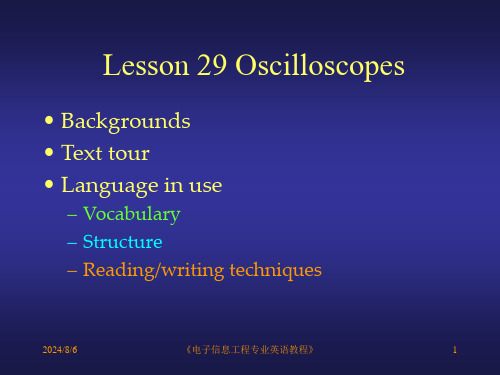
2024/8/6
《电子信息工程专业英语教程》
5
The Types of Oscilloscopes
• analog oscilloscope • digital oscilloscope
– digital storage oscilloscopes (DSOs) – digital phosphor oscilloscopes (DPOs) – digital sampling oscilloscopes
• Something that is an essential or necessary part of a system or object. 基础
• The lowest frequency of a periodically varying quantity or of a vibrating system. 基频
• Terminology
– CRT: Cathode Ray Tube 阴极射线管
– Transducer 传感器,变频器,变换器
– Fundamental frequency 基频
2024/8/6
《电子信息工程专业英语教程》
2
Backgrounds
• Terminology
– sonic boom 声爆
2024/8/6
《电子信息工程专业英语教程》
12
Digital Oscilloscopes
Digital Phosphor Oscilloscopes
Figure 10.6 The parallel-processing architecture of a digital phosphor oscilloscope (DPO)
电子信息类专业英语 第1章

Unit 1 Current, Voltage and Resistance
We shall define voltage “across” an element as the work
done in moving a unit charge (+1C) through the element from one terminal to the other. The term voltage (represented by the letter symbol U) is commonly used to indicate both a potential difference and an electromotive force. The unit in which voltage is measured is the volt(V). One volt is defined as that magnitude of electromotive force required cause a current of one ampere to pass through a conductor having a resistance of one ohm. Besides the volt, smaller or larger magnitude of voltage are expressed in millivolts(mV), microvolts(μV) or kilovolts(kV).
Unit 1 Current, Voltage and Resistance
Resistors restrict the flow of electric current, for example, a
电子信息工程专业英语词典
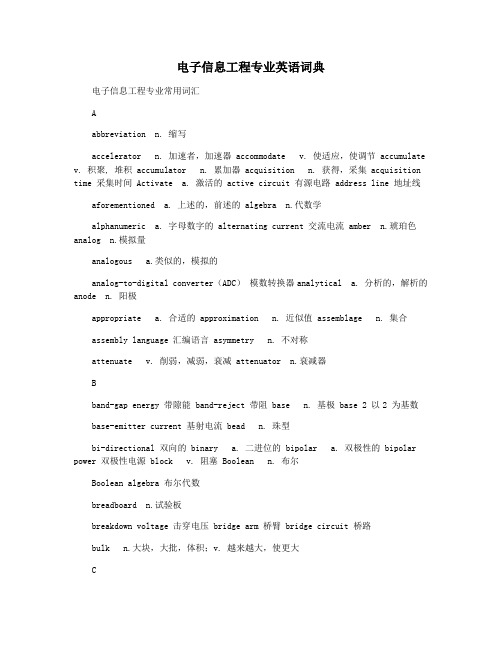
电子信息工程专业英语词典电子信息工程专业常用词汇Aabbreviation n. 缩写accelerator n. 加速者,加速器 accommodate v. 使适应,使调节 accumulate v. 积聚, 堆积 accumulator n. 累加器 acquisition n. 获得,采集 acquisition time 采集时间 Activate a. 激活的 active circuit 有源电路 address line 地址线aforementioned a. 上述的,前述的 algebra n.代数学alphanumeric a. 字母数字的 alternating current 交流电流 amber n.琥珀色analog n.模拟量analogous a.类似的,模拟的analog-to-digital converter(ADC)模数转换器analytical a. 分析的,解析的anode n. 阳极appropriate a. 合适的 approximation n. 近似值 assemblage n. 集合assembly language 汇编语言 asymmetry n. 不对称attenuate v. 削弱,减弱,衰减 attenuator n.衰减器Bband-gap energy 带隙能 band-reject 带阻 base n. 基极 base 2 以2 为基数base-emitter current 基射电流 bead n. 珠型bi-directional 双向的 binary a. 二进位的 bipolar a. 双极性的 bipolar power 双极性电源 block v. 阻塞 Boolean n. 布尔Boolean algebra 布尔代数breadboard n.试验板breakdown voltage 击穿电压 bridge arm 桥臂 bridge circuit 桥路bulk n.大块,大批,体积;v. 越来越大,使更大Ccalibration n. 刻度calibration n.标度, 刻度, 校准canonical n. 牧师礼服,法服;a. 依教规的,权威的capacitance n.电容量 cascade adj.级联的 cathode n. 阴极 Celsius a. 摄氏的 Celsius a. 摄氏的 channel n.通道characteristic n. 特性 charge n. 电荷v.充电 Choke v. 窒息,阻塞 circuit n.电路circuitry n. 电路,线路 cobalt n. 钴coefficients n. 系数 collector n. 集电极common mode rejection ratio (CMRR) 共模抑制比 common mode voltage 共模电压comparator n. 比较器 compatible a.兼容的compensation n. 补偿, 赔偿 complement n. 补充物compromise n.;v. 妥协,折中 concession n. 让步,妥协 conditioning n.调节,调理 conduct n.导体conduction band 传导带conductivity n. 传导性,传导率 configuration n.配置 constant n. 常数,恒量contiguous a. 邻近的,接近的 control line 控制线control-oriented 控制方向conversion time 转换时间, 变换时间 coulomb n. 库仑 counter n. 计数器criterion n. 标准critical frequency 临界频率, 截止频率 crocodile n. 鳄鱼cumbersome a. 麻烦的 cumbersome a. 笨重的 cursor n. 光标Cycle n. 循环, 周期Ddata line 数据线deactivate a. 非激活的decimal a. 十进位的, 小数的 decimal a. 十进位的,小数的 decode v. 解码,译解 deduce v. 推论, 演绎出delicate a. 细致优雅的,微妙的,美味的 deposit vt.存放, 堆积 designate v. 指定 desktop n. 桌面deterioration n. 恶化,退化 dielectric n. 电介质dielectric strength 电介质强度, 绝缘强度 differential amplifier 差动放大器differentiator n. 微分器diffuse v. 散播,使(光线)漫射 digital a. 数字的digital-to-analog converter(DAC)数模转换器diode n.二极管direct current 直流电流 disc n. 圆盘型 discharge v.放电discrete adj.不连续的, 离散的 dispatch v. 分发,派遣dissipate v. 使??消散(浪费) divert v. 转移divide v. 分开,分类 divider circuit 分压电路drift n. 漂流物, 漂流;v. 漂流 Dual-Slope Ramp ADC 双积分ADCEelectrode n.电极electrolytic capacitor 电解电容 electrolytic lead 电解铅electromotive a. 电的,电动的 electromotive force 电势electron n. 电子 emitter n. 发射极encapsulation n. 封装,包装encase v. 包围,装入箱内,把??装入箱中,包起 encode v. 编码entanglement n. 纠缠牵累 epoxy n. 环氧基树脂 equate vt. 等同,使相等equilibrium n. 平衡, 均衡erroneous a. 错误的,不正确的 establish vt. 建立evaluate v. 评估,评价 evolve v. 进展,进化 execute v. 执行exemplify v. 例证,例示 expansion slot 扩展槽 exponential a.指数的exponential decay 指数式衰减Ffabricate v. 制造,装配 factor n.因子Fahrenheit a. 华氏的;n. 华氏温度计 farad n. 法拉 feedback n.反馈ferrite n. 铁氧体 filter n. 滤波器 fine-tuning 调整finite open loop gain 有限开环增益 first order system 一阶系统 flowchart n.流程图fluctuation n. 波动,起伏 flux line 磁通线 follower n. 跟随器forward voltage 正向电压fraction n. 分数, 小部分, 破片 fractional a.分数的 full-duplex 全双工Ggalvanometer n.检流计gauge n. 标准度量,计量器generic a. 一般性的,标准样本应用程序 Germanium n. 锗gyration n. 回旋,回转,旋转Hhardware n.硬件 hard-wired 硬件线路 Henry n. 亨,亨利hexadecimal n. 十六进制,十六进制的 high-performance 高性能 Hole n.空穴hysteresis 滞后作用,磁滞现象 low-ripple source 低纹波源low-ripple 低纹波Mmacro a. 巨大的,突出的;n. 宏指令 magnetic field 磁场magnitude n.大小, 数量 mainline glue 主流程综述Iideal inverting amplifier 理想反向放大器 impedance n. 阻抗impede v. 妨碍,阻碍,阻止 impurity n. 杂质incandescent a. 白热的,发白热光的 increment n.增量increment n. 增加(增加物,增量,余差) induce v.感应inductance n. 电感,感应系数 inductor n.电感器 inequality n. 不等式inevitably ad. 不可避免地 infrared a. 红外线的 initialization values 初始值 initiate v. 开始,初始instantaneous a. 瞬间的,即刻的 instrumentation amplifier 仪器放大器insulate v. 使??绝缘,隔insulator n.绝缘体,绝热器 integral n. 积分integrated circuit 集成电路 integrator n.积分器 interpret n.解释interrupt n. 中断 interval n. 间隔 inverter n. 变换器 inverting input 反向输入 isolation n. 隔离,孤立 issue v. 发出Llatch v. 锁存lead compensation 导线补偿 leakage n. 泄漏linkage n. 联系,连锁,结合 logarithm n.对数 loop n.循环lower-lying energy state 低电能态maneuver n. 演习,调遣,策略;v. 调遣,演习,用计策measurement junction 测量点 megohm n.兆欧(姆) memory n. 存储器memory-read instruction 读存储器指令 metallic a. 金属的microwave band 微波带宽 microwave oven 微波炉 millivolt n.毫伏misuse vt.& n. 误用,滥用mnemonic a. 助记的,记忆的 modulo n. 模数;按模计算 molecule n. 分子multimeter n. 万用表 multiplexer n.多路器multiplication n. 乘法,增加 Multiply v.乘, 增加multivibrator n. 多谐振荡器N negligible a. 可以忽略的, 微不足道的nibble n. 轻咬,啃;v. 咬,一点点地咬,慢慢啃 nickel n.镍nonideal adj.非理想的noninverting input 同向输入 nonlinear a. 非线性的non-page-oriented 面向非页面的 nonsymmetrical a. 不对称的nonvolatile a. 永久的,长存的,不挥发的,非挥发性的notch filter 槽型滤波器 null n.零, 空numerator n.分子Oobsolete a. 已废弃的,过时的 obstacle n. 障碍 octal a.八进制的offset n. 偏移offset current 偏移电流 ohm n.欧姆omega n. 希腊字母的最后一个字Ω opcode(operand code) 操作码 open-collector 集电极开路operational amplifier 运算放大器optimize v. 使??完美,使??完善;v.优化 overlap n.(数)交迭,相交Pparallel a. 并行的parity n. 同等,同格,同位passive band-pass filter 无源带通滤波器 pedestrian n.行人Peltier effect 珀耳帖效应 peripheral a.外设的, n. 外设 peripheral a.外围的peruse v. 熟读,精读,阅读 pictorial a. 绘画的n. 画报 pinout 管脚引出platinum n. 白金plumb n. 测水锤,垂直;a. 垂直的;v. 探测,了解pointless a.无意义的 polarise vt. 极化 polyester n.聚酯polystyrene n. 聚苯乙烯 potential n.电位,电势potential drop 电位降,势能落差 precautions n. 预防,保护 prefix n. 前缀prescaler n. 预换算装置,预定标器 printed circuit board 印制电路板procedure n. 程序,步骤 processor 处理器program n. 编程,程序Program Status Word(PSW) 程序状态字 prolong v. 延长,拖延propagation n. 增殖,繁殖,传播 proportionately ad. 相称地,成比例地pull-up 上拉Qquadrature n.正交,九十度相位差 quote n. 引用;v. 引述, 举证, 报价Rradial a. 光线的,光线状的,放射状的 ramp voltage 斜坡电压 range n.幅度, 范围ratings n. 额定值capacitor [k__p_sit_] n.电容器 recipient n. 接受者rectangular wave 矩形波 rectifier diode 整流二极管 reference n. 参考reference junction 参考点 register n. 寄存器 relay n. 继电器reliability n. 可靠性remedial a. 治疗的,补救的,矫正的 repeatable a. 可重复的reposition n. 新位置;v. 改变??的位置 resistance coefficient 电阻系数resistive a. 电阻的 resistor n.电阻 restrict v.限制reverse voltage 反向电压rising (or falling) edge 上升(下降)沿 rod n. 棒型rudimentary a. 基本的,初步的,起码的,根本的Ssample-and-hold 采样保持 saturate vt.使饱和scheme n. 方案,蓝图,框架 Seebeck effect 塞贝克效应 self-nulling 自回零semiconductor n. 半导体 semiconductor n. 半导体 sensitivity n. 灵敏度 sequence n. 序列,顺序 sequential a. 连续的 shaft n.轴sheath n. 鞘,叶鞘, 翅鞘 shorthand n.速记 shunt vt. 分流(器)siblings n. 兄弟signal diode 信号二极管 silicon n. 硅sinusoidal a. 正弦曲线的slope n.斜率 Socket n. 插座 software n.软件soldering n. 焊接,锡焊,低温焊接 span n. 跨距 square wave 方波Stack Pointer (SP) 堆栈指针 stipulate v.规定stipulation n. 约束,约定,规定strobe n. 闸门(频闪观测器,频闪放电管);v. 闸(选通,发出选通脉冲)stuff n. 材料,原料,东西;v. 填满,塞满 subroutine n. 子程序subscript n.下标,标记Successive Approximation ADC 逐次逼近ADC suffix n. 后缀superimpose vt. 重叠(安装, 添加) supplier n. 供应商Ttally n. 标签(手执计数器,对应物);v. 计算(记录) tantalum n.钽(金属元素) Teflon n. 聚四氟乙烯 theoretical a. 理论上的 thermal a. 热的,热量的 thermal a. 热的,热量的 thermistor n. 热敏电阻 thermocouple n. 热电偶 thermoelectric a. 热电的 thermometer n. 温度计 thermostat n. 恒温器thermostatic a. 温度调节装置的Thévenin equivalent circuit 戴维南等效电路 timer n. 计时器,定时器tolerance n.容限,公差,允许误差 traffic table 切换表;交通图 transient response 暂态响应 transistor n. 晶体管transparent a. 可为某种射线所透射的,透明的 trigger n.触发器 trimmer adj. 可变的 tri-state buffer 三态缓冲器 truncate v. 截去 tube n.电子管tune v. 调谐twin-T filter 双T 滤波器twist n. 扭曲;v. 拧,扭曲Uultraviolet-Erasable 紫外线可擦除的 uncertainty n. 不确定 unidirectional n.单向性的 unipolar a. 单极性的USART (Universal Serial Asynchronous Receiver & Transmitter)通用串行异步收发器VVacuum n. 真空,空间,真空吸尘器 valence n. 化合价 valence band 价(电子)带 valence band 价(电子)带 valence electron 价电子 valve n.阀variation n. 变化, 变动 versus n.对抗vibrate v. (使)振动,(使)摇摆;摇动,震动 vibration n. 震动,颤动voltage detector 电压侦测器 voltage follower 电压跟随器voltage regulator 稳压器,电压调节器WWheatstone bridge 惠斯登电桥Zzener diode 稳压二极管,齐纳二极管 zener voltage 齐纳电压 zeroing n. 零位调整感谢您的阅读,祝您生活愉快。
电子信息工程专业英语教程课后练习题含答案
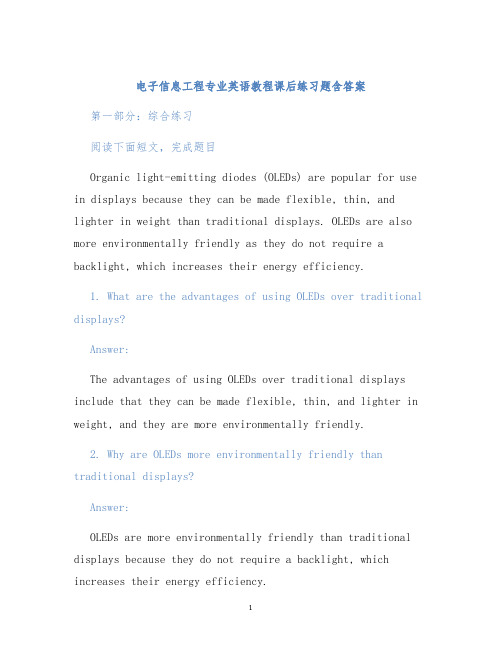
电子信息工程专业英语教程课后练习题含答案第一部分:综合练习阅读下面短文,完成题目Organic light-emitting diodes (OLEDs) are popular for use in displays because they can be made flexible, thin, and lighter in weight than traditional displays. OLEDs are also more environmentally friendly as they do not require a backlight, which increases their energy efficiency.1. What are the advantages of using OLEDs over traditional displays?Answer:The advantages of using OLEDs over traditional displays include that they can be made flexible, thin, and lighter in weight, and they are more environmentally friendly.2. Why are OLEDs more environmentally friendly than traditional displays?Answer:OLEDs are more environmentally friendly than traditional displays because they do not require a backlight, which increases their energy efficiency.完成下面句子,使其意思与原文相同1. The growth of social media platforms has led to an increase in cyberbullying.Answer:An increase in cyberbullying has been caused by the growth of social media platforms.2. The researchers found that there was a significant difference between the two groups.Answer:A significant difference between the two groups was found by the researchers.第二部分:专业术语练习选择最恰当的词汇,完成下面句子1. _______ is a circuit that can perform a single operation.A. DecoderB. EncoderC. Flip-flopD. GateAnswer:D. GateExplanation:A gate is a circuit that performs a single operation, such as AND, OR, or NOT.2. _______ refers to the process of converting an analog signal into digital form.A. SynthesisB. ModulationC. SamplingD. QuantizationAnswer:C. SamplingExplanation:Sampling refers to the process of converting an analog signal into digital form, where the value of the signal is sampled at regular intervals.根据定义给出对应术语1. The study of electronic devices and circuits.Answer:Electronics2. A device that supports the transfer of data between different networks.Answer:Gateway第三部分:阅读理解请阅读下面短文,并根据所提出的问题选择正确的答案。
电子信息专业英语(12)
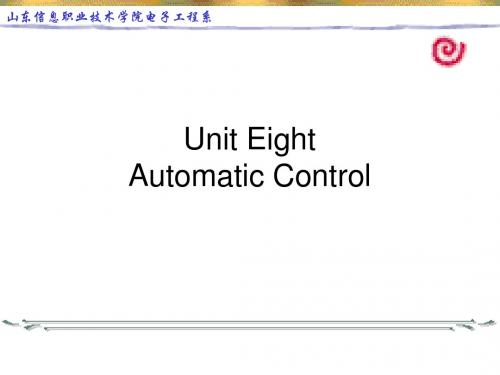
Correction
Feedback Control Loop
Error etector Computation Comparison Desired value
Measuring Eelement
Measurement
事先调整预先安置预先调试tank盛液体气体的大容器桶箱池槽closedloopcontrolsystem闭环控制系统variable变量山东信息职业技术学院电子工程系controlledvariable被控变量manipulatedvariable控制变量actonupon对
山东信息职业技术学院电子工程系
山东信息职业技术学院电子工程系 controlled variable 被控变量 manipulated variable 控制变量 act on/upon 对……起作用,按照……而行动,施于,作用于 transmitter [ trænz'mitə] n. 变送器,转送者,传导物 final control element 末级控制元件 evaluate [ i'væljueit ] vt. 评估,评价,计算 deviation [ˌ di:vi'eiʃən ] n. 背离,偏离 feedback [ 'fi:dbæk ] n. 反馈,反应 tend to 易于,倾向于,有助于 disturbance [ di'stə:bəns ] n. 扰动 on the basis of 以……为基础,根据……,基于…… identify [ ai'dentifai ] vt. 确定,打出,识别 actuating signal 执行信号 error signal 误差信号 upset [ ʌp'set, 'ʌpset ] vt. 打乱,扰乱,搅动 prescribed [ pris'kraibd ] adj. 规定的,法定的
《电子信息专业英语》课程标准9
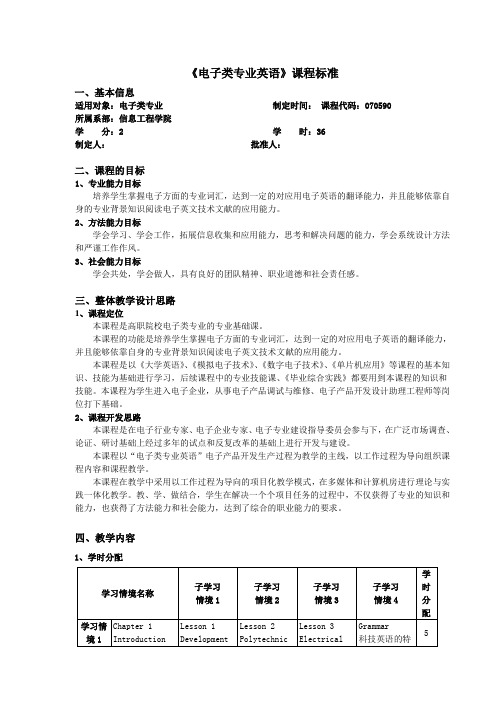
《电子类专业英语》课程标准一、基本信息适用对象:电子类专业制定时间:课程代码:070590 所属系部:信息工程学院学分:2 学时:36制定人:批准人:二、课程的目标1、专业能力目标培养学生掌握电子方面的专业词汇,达到一定的对应用电子英语的翻译能力,并且能够依靠自身的专业背景知识阅读电子英文技术文献的应用能力。
2、方法能力目标学会学习、学会工作,拓展信息收集和应用能力,思考和解决问题的能力,学会系统设计方法和严谨工作作风。
3、社会能力目标学会共处,学会做人,具有良好的团队精神、职业道德和社会责任感。
三、整体教学设计思路1、课程定位本课程是高职院校电子类专业的专业基础课。
本课程的功能是培养学生掌握电子方面的专业词汇,达到一定的对应用电子英语的翻译能力,并且能够依靠自身的专业背景知识阅读电子英文技术文献的应用能力。
本课程是以《大学英语》、《模拟电子技术》、《数字电子技术》、《单片机应用》等课程的基本知识、技能为基础进行学习,后续课程中的专业技能课、《毕业综合实践》都要用到本课程的知识和技能。
本课程为学生进入电子企业,从事电子产品调试与维修、电子产品开发设计助理工程师等岗位打下基础。
2、课程开发思路本课程是在电子行业专家、电子企业专家、电子专业建设指导委员会参与下,在广泛市场调查、论证、研讨基础上经过多年的试点和反复改革的基础上进行开发与建设。
本课程以“电子类专业英语”电子产品开发生产过程为教学的主线,以工作过程为导向组织课程内容和课程教学。
本课程在教学中采用以工作过程为导向的项目化教学模式,在多媒体和计算机房进行理论与实践一体化教学。
教、学、做结合,学生在解决一个个项目任务的过程中,不仅获得了专业的知识和能力,也获得了方法能力和社会能力,达到了综合的职业能力的要求。
四、教学内容1、学时分配2、教学设计五、课程考核标准说明:1、在每个学习情境完成后,有相应的教学评价与考核。
考核依据项目操作过程、完成结果以及项目报告等。
电子信息工程专业英语词汇精华版

电子信息工程专业英语词汇精华版公司标准化编码 [QQX96QT-XQQB89Q8-NQQJ6Q8-MQM9N]transistor n 晶体管diode n 二极管semiconductor n 半导体resistor n 电阻器capacitor n 电容器alternating adj 交互的amplifier n 扩音器,放大器integrated circuit 集成电路linear time invariant systems 线性时不变系统voltage n 电压,伏特数tolerance n 公差;宽容;容忍condenser n 电容器;冷凝器dielectric n 绝缘体;电解质electromagnetic adj电磁的adj 非传导性的deflection n偏斜;偏转;偏差linear device 线性器件the insulationresistance 绝缘电阻anode n 阳极,正极cathode n阴极breakdown n 故障;崩溃terminal n终点站;终端,接线端emitter n 发射器collect v收集,集聚,集中insulator n 绝缘体,绝热器oscilloscope n示波镜;示波器gain n 增益,放大倍数forward biased 正向偏置reverse biased 反向偏置P-N junction PN结MOS(metal-oxidesemiconductor)金属氧化物半导体enhancement andexhausted 增强型和耗尽型integrated circuits集成电路analog n 模拟digital adj 数字的,数位的horizontal adj, 水平的,地平线的vertical adj 垂直的,顶点的amplitude n 振幅,广阔,丰富attenuation n衰减;变薄;稀薄化multimeter n 万用表frequency n 频率,周率the cathode-ray tube 阴极射线管dual-trace oscilloscope 双踪示波器signal generatingdevice 信号发生器peak-to-peak output voltage 输出电压峰峰值sine wave 正弦波triangle wave 三角波square wave 方波amplifier 放大器,扩音器oscillator n 振荡器feedback n 反馈,回应phase n 相,阶段,状态filter n 滤波器,过滤器rectifier n整流器;纠正者band-stop filter带阻滤波器band-pass filter 带通滤波器decimal adj 十进制的,小数的hexadecimal adj/n十六进制的binary adj 二进制的;二元的octal adj 八进制的domain n 域;领域code n代码,密码,编码v编码the Fourier transform傅里叶变换Fast Fourier Transform快速傅里叶变换microcontroller n 微处理器;微控制器assembly languageinstrucions n 汇编语言指令chip n 芯片,碎片modular adj 模块化的;模数的sensor n 传感器plug vt堵,塞,插上n 塞子,插头,插销coaxial adj 同轴的,共轴的fiber n 光纤relay contact 继电接触器single instruction programmer 单指令编程器dedicated manufactures programming unit 专供制造厂用的编程单元beam n (光线的)束,柱,梁polarize v(使)偏振,(使)极化Cathode Ray Tube(CRT)阴极射线管neuron n神经元;神经细胞fuzzy adj 模糊的Artificial IntelligenceShell 人工智能外壳程序Expert Systems 专家系统Artificial Intelligence人工智能Perceptive Systems 感知系统neural network 神经网络fuzzy logic 模糊逻辑intelligent agent 智能代理electromagnetic adj电磁的coaxial adj 同轴的,共轴的microwave n 微波charge v充电,使充电insulator n 绝缘体,绝缘物nonconductive adj非导体的,绝缘的antenna n天线;触角modeling n建模,造型simulation n 仿真;模拟prototype n 原型array n 排队,编队vector n 向量,矢量wavelet n 微波,小浪sine 正弦 cosine余弦inverse adj倒转的,反转的n反面;相反v倒转high-performance 高精确性,高性能two-dimensional 二维的;缺乏深度的three-dimensional 三维的;立体的;真实的object-oriented programming面向对象的程序设计spectral adj 光谱的attenuation n衰减;变薄;稀释distortion n 失真,扭曲,变形wavelength n 波长refractive adj 折射的ATM 异步传输模式Asynchronous Transfer ModeADSL非对称用户数字线Asymmetric digital subscriber lineVDSL甚高速数字用户线very high data rate digital subscriber lineHDSL高速数据用户线 high rate digital subscriber line FDMA频分多址(FrequencyDivision MultipleAccess)TDMA时分多址(TimeDivision MultipleAccess)CDMA同步码分多址方式(Code Division MultipleAccess)WCDMA宽带码分多址移动通信系统(Wideband CodeDivision MultipleAccess)TD-SCDMA(Time DivisionSynchronous CodeDivision MultipleAccess)时分同步码分多址SDLC(synchronous datalink control)同步数据链路控制HDLC(high-level datalink control)高级数据链路控制IP/TCP(internetprotocol /transferControl Protocol)网络传输控制协议ITU (InternationalTelecommunication Union)国际电信联盟ISO国际标准化组织(InternationalStandardizationOrganization);OSI开放式系统互联参考模型(Open SystemInterconnect)GSM全球移动通信系统(Global System forMobile Communications)GPRS通用分组无线业务(General Packet RadioService)FDD(frequency divisionduplex)频分双工TDD(time divisionduplex)时分双工VPI虚路径标识符(Virtual PathIdentifier);ISDN(Integrated Services Digital Network)综合业务数字网IDN综合数字网(integrated digital network)HDTV (high definition television)高清晰度电视DCT(Discrete Cosine Transform)离散余弦变换VCI(virtual circuit address)虚通路标识MAN城域网Metropolitan area networksLAN局域网local area networkWAN广域网wide area network同步时分复用STDM Synchronous Time Division Multiplexing统计时分复用STDM Statistical Time Division Multiplexing 单工传输simplextransmission半双工传输half-duplextransmission全双工传输full-duplextransmission交换矩阵SwitchingMatrix电路交换 circuitswitching分组交换packetswitching报文交换messageswitching奇偶校验parity checking循环冗余校验CRC CyclicRedundancy Check虚过滤Virtual filter数字滤波digitalfiltering伪随机比特Quasi RandomBit带宽分配 Bandwidthallocation信源information source信宿destination数字化digitalize数字传输技术Digitaltransmission technology灰度图像Grey scaleimages灰度级Grey scale level幅度谱Magnitudespectrum相位谱Phase spectrum频谱frequency spectrum智能设备Smart Device软切换Soft handover硬切换 Hard Handover相干检测Coherentdetection边缘检测Edge detection冲突检测collision detection业务集合service integration业务分离/综合service separation/ integration网络集合network integration环形网Ring networks令牌环网Token Ring network网络终端Network Terminal用户终端user terminal用户电路line circuit电路利用率channel utilization(通道利用率)相关性coherence相干解调coherent demodulation数字图像压缩digital image compression 图像编码image encoding有损/无损压缩lossy/losslesscompression解压decompression呼叫控制Call Control误差控制error control存储程序控制storedprogram control存储转发方式store-and-forward manner语音\视频传输voice\videotransmission视频点播video-on-demand(VOD)会议电视VideoConference有线电视cabletelevision量化quantization吞吐量throughput话务量traffic多径分集Multipathdiversity多媒体通信MDMMultimediaCommunication多址干扰Multiple AccessInterference人机交互man machineinterface交互式会话Conversationalinteraction路由算法RoutingAlgorithm目标识别Objectrecognition话音变换Voice transform中继线trunk line传输时延transmissiondelay远程监控remotemonitoring光链路optical link拓扑结构Topology均方根root mean squarewhatsoever=whateverswitchboard (电话)交换台bipolar (电子)双极的premise (复)房屋,前提cursor (计算机尺的)游标,指导的elapse (时间)经过,消失vaporize (使)蒸发subsystem (系统的)分部,子系统,辅助系统metallic (像)金属的,含金属的,(声音)刺耳的dispatch (迅速)派遣,急件consensus (意见)一致,同意deadline (最后)期限,截止时间tomographic X线体层摄像的alas 唉,哎呀cluster 把…集成一束,一组,一簇,一串,一群encyclopedia 百科全书millionfold 百万倍的semiconductor 半导体radius 半径范围,半径,径向射线half-duplextransmission 半双工传输accompaniment 伴随物,附属物reservation 保留,预定quotation 报价单,行情报告,引语memorandum 备忘录redundancy 备用be viewed as 被看作…be regards as 被认为是as such 本身;照此;以这种资格textual 本文的,正文的verge 边界variation 变化,变量conversion 变化,转化identity 标识;标志criterion 标准,准则in parallel on 并联到,合并到juxtapose 并置,并列dialing pulse 拨号脉冲wave-guide 波导wavelength division multiplexed 波分复用baud rate 波特率playback 播放(录音带,唱片)no greater than 不大于update 不断改进,使…适合新的要求,更新asymmetric 不对称的irrespective 不考虑的,不顾的inevitably 不可避免的inevitable 不可避免的,不可逃避的,必定的segment 部分abrasion 擦伤,磨损deploy 采用,利用,推广应用take the form of 采用…的形式parameter 参数,参量layer 层dope 掺杂FET(field effecttransistors) 场效应管audio recording 唱片ultra-high-frequency(UHF) 超高频in excess of 超过in excess of 超过hypertext 超文本ingredient 成分,因素ingredient 成分,组成部分,要素metropolitan-areanetwork(WAN) 城域网metropolitan areanetwork(WAN) 城域网,城市网络congestion 充满,拥挤,阻塞collision 冲突extractive 抽出;释放出extract 抽取,取出,分离lease 出租,租约,租界期限,租界物pass on 传递,切换transmission 传输facsimile 传真innovative=innovatory创新的,富有革新精神的track 磁道impetus 促进,激励cluster 簇stored-programcontrol(SPC) 存储程序控制a large number of大量的peal 大声响,发出supersede 代替supplant 代替,取代out-of-band signaling带外信号simplex transmission单工传输monochromatic 单色的,单色光的,黑白的ballistic 弹道的,射击的,冲击的conductor 导体hierarchy 等级制度,层次infrastructure 底层结构,基础结构geographic 地理的,地区的geographically 地理上GIS(groundinstrumentation system)地面测量系统ground station 地面站earth orbit 地球轨道extraterrestrial 地球外的,地球大气圈外的Land-sat 地球资源卫星rug 地毯,毯子ignite 点火,点燃,使兴奋electromagnetic 电磁的inductive 电感arc 电弧telephony 电话(学),通话dielectric 电介质,绝缘材料;电解质的,绝缘的capacitor 电容telecommunication 电信,无线电通讯scenario 电影剧本,方案modem pool 调制解调器(存储)池superimposing 叠加,重叠pin 钉住,扣住,抓住customize 定做,定制monolithic 独立的,完全统一的aluminize 镀铝strategic 对全局有重要意义的,战略的substantial 多的,大的,实际上的multi-path fading 多径衰落multi-path 多路,多途径;多路的,多途径的multi-access 多路存取,多路进入multiplex 多路复用multiplex 多路复用的degradation 恶化,降级dioxide 二氧化碳LED(light-emitting-diode) 发光二极管evolution 发展,展开,渐进feedback 反馈,回授dimension 范围,方向,维,元scenario 方案scenario 方案,电影剧本amplifer 放大器noninvasive 非侵略的,非侵害的tariff 费率,关税率;对…征税distributed functionalplane(DFP) 分布功能平面DQDB(distributed queuedual bus) 分布式队列双总线hierarchy 分层,层次partition 分成segmentation 分割interface 分界面,接口asunder 分开地,分离地detached 分离的,分开的,孤立的dispense 分配allocate 分配,配给;配给物centigrade 分为百度的,百分度的,摄氏温度的fractal 分形molecule 分子,微小,些微cellular 蜂窝状的cellular 蜂窝状的,格形的,多孔的auxiliary storage(alsocalled secondarystorage) 辅助存储器decay 腐烂,衰减,衰退negative 负电vicinity 附近,邻近vicinity 附近地区,近处sophisticated 复杂的,高级的,现代化的high-frequency(HF)高频high definitiontelevision 高清晰度电视chromium 铬annotate 给…作注解in terms of 根据,按照disclosure 公布,企业决算公开public network 公用网functionality 功能,功能度mercury 汞resonator 共鸣器resonance 共振whimsical 古怪的,反复无常的administration 管理,经营cursor 光标(显示器),游标,指针optical computer 光计算机photoconductor 光敏电阻optical disks 光盘optically 光学地,光地wide-area networks广域网specification 规范,说明书silicon 硅the internationaltelecommunicationunion(ITU) 国际电信联盟excess 过剩obsolete 过时的,废弃的maritime 海事的synthetic 合成的,人造的,综合的synthetic 合成的,综合性的rational 合乎理性的rationalization 合理化streamline 合理化,理顺infrared 红外线的,红外线skepticism 怀疑论ring network 环形网hybrid 混合物counterpart 伙伴,副本,对应物electromechanical 机电的,电动机械的Robot 机器人Robotics 机器人技术,机器人学accumulation 积累infrastructure 基础,基础结构substrate 基质,底质upheaval 激变,剧变compact disc 激光磁盘(CD)concentrator 集中器,集线器centrex system 集中式用户交换功能系统converge on 集中于,聚集在…上lumped element 集总元件CAI(computer-aided instruction) 计算机辅助教学computer-integrated manufacturing(CIM)计算机集成制造computer mediated communication(CMC)计算机中介通信record 记录register 记录器,寄存器expedite 加快,促进weight 加权accelerate 加速,加快,促进categorize 加以类别,分类in addition 加之,又,另外hypothetical 假设的rigidly 坚硬的,僵硬的compatibility 兼容性,相容性surveillance 监视surveillance 监视retrieval 检索,(可)补救verification 检验simplicity 简单,简明film 胶片,薄膜take over 接管,接任ruggedness 结实threshold 界限,临界值with the aid of 借助于,用,通过wire line 金属线路,有线线路coherent 紧凑的,表达清楚的,粘附的,相干的compact 紧密的approximation 近似undertake 进行,从事transistor 晶体管elaborate 精心制作的,细心完成的,周密安排的vigilant 警戒的,警惕的alcohol 酒精,酒local areanetworks(LANs) 局域网local-areanetworks(LANs) 局域网drama 剧本,戏剧,戏剧的演出focus on 聚集在,集中于,注视insulator 绝缘root mean square 均方根uniform 均匀的open-system-interconnection(OSI)开放系统互连expire 开始无效,满期,终止immunity 抗扰,免除,免疫性take…into account考虑,重视…programmable industrial automation 可编程工业自动化demountable 可拆卸的tunable 可调的reliable 可靠be likely to 可能,大约,像要videotex video 可视图文电视negligible 可以忽略的aerial 空气的,空中的,无形的,虚幻的;天线broadband 宽(频)带pervasive 扩大的,渗透的tensile 拉力的,张力的romanticism 浪漫精神,浪漫主义discrete 离散,不连续ion 离子force 力量;力stereophonic 立体声的continuum 连续统一体,连续统,闭联集smart 灵巧的;精明的;洒脱的token 令牌on the other hand 另一方面hexagonal 六边形的,六角形的hexagon 六角形,六边形monopoly 垄断,专利video-clip 录像剪辑aluminum 铝pebble 卵石,水晶透镜forum 论坛,讨论会logical relationships逻辑关系code book 码本pulse code modulation(PCM) 脉冲编码调制roam 漫步,漫游bps(bits per second)每秒钟传输的比特ZIP codes 美国邮区划分的五位编码susceptible(to) 敏感的,易受…的analog 模拟,模拟量pattern recognition模式识别bibliographic 目录的,文献的neodymium 钕the european telecommunication standardization institute(ETSI) 欧洲电信标准局coordinate 配合的,协调的;使配合,调整ratify 批准,认可bias 偏差;偏置deviate 偏离,与…不同spectrum 频谱come into play 其作用entrepreneurial 企业的heuristic methods 启发式方法play a …role(part)起…作用stem from 起源于;由…发生organic 器官的,有机的,组织的hypothesis 前提front-end 前置,前级potential 潜势的,潜力的intensity 强度coincidence 巧合,吻合,一致scalpel 轻便小刀,解剖刀inventory 清单,报表spherical 球的,球形的distinguish 区别,辨别succumb 屈服,屈从,死global functionalplane(GFP) 全局功能平面full-duplextransmission 全双工传输hologram 全息照相,全息图deficiency 缺乏thermonuclear 热核的artifact 人工制品AI(artificial intelligence) 人工智能fusion 熔解,熔化diskettes(also called floppy disk) 软盘sector 扇区entropy 熵uplink 上行链路arsenic 砷neural network 神经网络very-high-frequency(VHF)甚高频upgrade 升级distortion 失真,畸变identification 识别,鉴定,验明pragmatic 实际的implementation 实施,实现,执行,敷设entity 实体,存在vector quantification矢量量化mislead 使…误解,给…错误印象,引错vex 使烦恼,使恼火defy 使落空facilitate 使容易,促进retina 视网膜compatible 适合的,兼容的transceiver 收发两用机authorize 授权,委托,允许data security 数据安全性data independence 数据独立data management 数据管理database 数据库database managementsystem(DBMS) 数据库管理信息系统database transaction数据库事务data integrity 数据完整性,数据一致性attenuation 衰减fading 衰落,衰减,消失dual 双的,二重的transient 瞬时的deterministic 宿命的,确定的algorithm 算法dissipation 损耗carbon 碳diabetes 糖尿病cumbersome 讨厌的,麻烦的,笨重的razor 剃刀,剃go by the name of 通称,普通叫做commucation session通信会话traffic 通信业务(量)synchronous transmission 同步传输concurrent 同时发生的,共存的simultaneous 同时发生的,同时做的simultaneous 同时发生的,一齐的coaxial 同轴的copper 铜statistical 统计的,统计学的dominate 统治,支配invest in 投资perspective 透视,角度,远景graphics 图示,图解pictorial 图像的coating 涂层,层deduce 推理reasoning strategies推理策略inference engine 推理机topology 拓扑结构heterodyne 外差法的peripheral 外界的,外部的,周围的gateway 网关hazardous 危险的microwave 微波(的)microprocessor 微处理机,微处理器microelectronic 微电子nuance 微小的差别(色彩等)encompass 围绕,包围,造成,设法做到maintenance 维护;保持;维修satellite communication卫星通信satellite network 卫星网络transceiver 无线电收发信机radio-relaytransmission 无线电中继传输without any doubt 无疑passive satellite 无源卫星sparse 稀少的,稀疏的downlink 下行链路precursor 先驱,前任visualization 显像feasibility 现实性,可行性linearity 线性度constrain 限制,约束,制约considerable 相当的,重要的geo-stationary 相对地面静止by contrast 相反,而,对比起来coorelation 相关性mutual 相互的mutually 相互的,共同的interconnect 相互连接,互连one after the other相继,依次minicomputer 小型计算机protocol 协议,草案protocol 协议,规约,规程psycho-acoustic 心理(精神)听觉的;传音的channelization 信道化,通信信道选择run length encoding行程编码groom 修饰,准备virtual ISDN 虚拟ISDNmultitude 许多,大批,大量whirl 旋转preference 选择,喜欢avalanche 雪崩pursue 寻求,从事interrogation 询问dumb 哑的,不说话的,无声的subcategory 亚类,子种类,子范畴orbital 眼眶;轨道oxygen 氧气,氧元素service switching andcontrol points(SSCPs)业务交换控制点service controlpoints(SCPs) 业务控制点service controlfunction(SCF) 业务控制功能in concert 一致,一齐handover 移交,越区切换at a rate of以……的速率in the form of 以…的形式base on…以…为基础yttrium 钇(稀有金属,符号Y)asynchronoustransmission 异步传输asynchronous 异步的exceptional 异常的,特殊的voice-grade 音频级indium 铟give rise to 引起,使产生cryptic 隐义的,秘密的hard disk 硬盘hard automation 硬自动化by means of 用,依靠equip with 用…装备subscriber 用户telex 用户电报PBX(private branch exchange) 用户小交换机或专用交换机be called upon to用来…,(被)要求…superiority 优势predominance 优势,显着active satellite 有源卫星in comparison with与…比较comparable to 与…可比preliminary 预备的,初步的premonition 预感,预兆nucleus 原子核valence 原子价circumference 圆周,周围teleprocessing 远程信息处理,遥控处理perspective 远景,前途constrain 约束,强迫mobile 运动的,流动的,机动的,装在车上的convey 运输,传递,转换impurity 杂质impurity 杂质,混杂物,不洁,不纯regenerative 再生的improve over在……基础上改善play important role in在…中起重要作用in close proximity在附近,在很近underlying 在下的,基础的in this respect 在这方面entail 遭遇,导致presentation 赠与,图像,呈现,演示narrowband 窄(频)带deploy 展开,使用,推广应用megabit 兆比特germanium 锗positive 正电quadrature 正交orthogonal 正交的quadrature amplitude modulation(QAM) 正交幅度调制on the right track正在轨道上sustain 支撑,撑住,维持,持续outgrowh 支派;长出;副产品dominate 支配,统治knowledgerepresentation 知识表示knowledge engineering知识工程knowledge base 知识库in diameter 直径helicopter 直升飞机acronym 只取首字母的缩写词as long as 只要,如果tutorial 指导教师的,指导的coin 制造(新字符),杜撰fabrication 制造,装配;捏造事实proton 质子intelligence 智能,智力,信息intelligent network智能网intermediate 中间的nucleus 中心,核心neutrons 中子terminal 终端,终端设备overlay 重叠,覆盖,涂覆highlight 重要的部分,焦点charge 主管,看管;承载dominant 主要的,控制的,最有力的cylinder 柱面expert system 专家系统private network 专用网络transition 转变,转换,跃迁relay 转播relay 转播,中继repeater 转发器,中继器pursue 追赶,追踪,追求,继续desktop publish 桌面出版ultraviolet 紫外线的,紫外的;紫外线辐射field 字段vendor 自动售货机,厂商naturally 自然的;天生具备的synthesize 综合,合成integrate 综合,使完全ISDN(intergrated services digital network) 综合业务数字网as a whole 总体上bus network 总线形网crossbar 纵横,交叉impedance 阻抗initial 最初的,开始的optimum 最佳条件appear as 作为…出现A Analog 模拟A/D Analog toDigital 模-数转换AAC Advanced AudioCoding 高级音频编码ABB Automatic BlackBalance 自动黑平衡ABC AmericanBroadcasting Company 美国广播公司Automatic BassCompensation 自动低音补偿Automatic BrightnessControl 自动亮度控制ABL Automatic BlackLevel 自动黑电平ABLC AutomaticBrightness LimiterCircuit 自动亮度限制电路ABU AsianBroadcasting Union 亚洲广播联盟(亚广联ABS American Bureauof Standard 美国标准局AC Access Conditions接入条件Audio Center 音频中心ACA Adjacent ChannelAttenuation 邻频道衰减ACC AutomaticCentering Control 自动中心控制Automatic ChromaControl 自动色度(增益ACK Automatic ChromaKiller 自动消色器ACP Additive ColourProcess 加色法ACS Access Control System 接入控制系统Advanced Communication Service 高级通信业务Area Communication System 区域通信系统ADC Analog to Digital Converter 模-数转换器Automatic Degaussirng Circuit 自动消磁电路ADL Acoustic Delay Line 声延迟线ADS Audio Distribution System 音频分配系统AE Audio Erasing 音频(声音AEF Automatic Editing Function 自动编辑功能 AES AudioEngineering Society 音频工程协会AF Audio Frequency音频AFA Audio FrequencyAmplifier 音频放大器AFC AutomaticFrequency Coder 音频编码器Automatic FrequencyControl 自动频率控制AFT Automatic FineTuning 自动微调Automatic FrequencyTrack 自动频率跟踪Automatic FrequencyTrim 自动额率微调AGC Automatic GainControl 自动增益控制AI ArtificialIntelligence 人工智能ALM Audio-LevelMeter 音频电平表AM AmplitudeModulation 调幅AMS Automatic MusicSensor 自动音乐传感装置ANC Automatic NoiseCanceller 自动噪声消除器ANT ANTenna 天线AO Analog Output 模拟输出APS AutomaticProgram Search 自动节目搜索APPS AutomaticProgram Pause System 自动节目暂停系统APSS AutomaticProgram Search System 自动节目搜索系统AR Audio Response 音频响应ARC Automatic RemoteControl 自动遥控ASCII American Standard Code for Information Interchange 美国信息交换标准AST Automatic Scanning Tracking 自动扫描跟踪ATC Automatic Timing Control 自动定时控制Automatic Tone Correction 自动音频校正ATM Asynchronous Transfer Mode 异步传输模式ATF Automatic Track Finding 自动寻迹ATS Automatic Test System 自动测试系统ATSC Advanced Television Systems Committee (美国高级电视制式委员会)***C Automatic Volume Control 自动音量控制***R AutomaticVoltage Regulator 自动稳压器AWB Automatic WhiteBalance 自动白平衡AZC AutomaticZooming Control 自动变焦控制AZS Automatic ZeroSetting 自动调零BA Branch Amplifier分支放大器Buffer Amplifier 缓冲放大器BAC Binary-AnalogConversion 二进制模拟转换BB Black Burst 黑场信号BBC BritishBroadcasting Corporation英国广播公司BBI BeijingBroadcasting Institute北京广播学院BC Binary Code 二进制码Balanced Current 平衡电流Broadcast Control 广播控制BCT BandwidthCompression Technique 带宽压缩技术BDB Bi-directionalData Bus 双向数据总线BER Basic EncodingRules 基本编码规则Bit Error Rate 比特误码率BF Burst Flag 色同步旗脉冲BFA Bare FiberAdapter 裸光纤适配器Brillouin FiberAmplifier 布里渊光纤放大器BGM Background Music 背景音乐BIOS Basic Input/Output System 基本输入输出系统B-ISDN Broadband-ISDN 宽带综合业务数据网BIU Basic Information Unit 基本信息单元Bus Interface Unit 总线接口单元BM Bi-phase Modulation 双相调制BML Business Management Layer 商务管理层BN Backbone Network 主干网BNT Broadband Network Termination 宽带网络终端设备 BO Bus Out 总线输出BPG Basic PulseGenerator 基准脉冲发生器BPS Band Pitch Shift分频段变调节器BSI British StandardInstitute 英国标准学会BSS BroadcastSatellite Service 广播卫星业务BT Block Terminal 分线盒、分组终端British Telecom 英国电信BTA BroadbandTerminal Adapter 宽带终端适配器BroadcastingTechnology Association(日本BTL BalancedTransformer-Less 桥式推挽放大电路BTS BroadcastTechnical Standard 广播技术标准BTU BasicTransmission Unit 基本传输单元BVU BroadcastingVideo Unit 广播视频型(一种3/4英寸带录像机记录格式BW BandWidth 带宽BWTV Black and WhiteTelevision 黑白电视CA ConditionalAccess 条件接收CAC ConditionalAccess Control 条件接收控制CAL ContinuityAccept Limit 连续性接受极限CAS ConditionalAccess System 条件接收系统Conditional AccessSub-system 条件接收子系统CATV Cable Television 有线电视,电缆电视Community Antenna Television 共用天线电视C*** Constant Angular Velocity 恒角速度CBC Canadian Broadcasting Corporation 加拿大广播公司CBS Columbia Broadcasting System (美国哥伦比亚广播公司CC Concentric Cable 同轴电缆CCG Chinese Character Generator 中文字幕发生器CCIR International Radio Consultative Committee 国际无线电咨询委员会CCITT InternationalTelegraph and TelephoneConsultativeCommittee 国际电话电报咨询委员会CCR Central ControlRoom 中心控制室CCTV China CentralTelevision 中国中央电视台Close-CircuitTelevision 闭路电视CCS Center CentralSystem 中心控制系统CCU Camera ControlUnit 摄像机控制器CCW Counter Clock-Wise 反时针方向CD Compact Disc 激光唱片CDA Current DumpingAmplifier 电流放大器CD-E Compact DiscErasable 可抹式激光唱片CDFM Compact DiscFile Manager 光盘文件管理(程序CDPG Compact-DiscPlus Graphic 带有静止图像的CD唱盘CD-ROM Compact Disc-Read Only Memory 只读式紧凑光盘CETV ChinaEducational Television中国教育电视台CF Color Framing 彩色成帧CGA Color GraphicsAdapter 彩色图形(显示卡CI Common Interface通用接口CGA Color GraphicsAdapter 彩色图形(显示卡CI Common Interface通用接口CIE ChineseInstitute of Electronics 中国电子学会CII China Information Infrastructure 中国信息基础设施CIF Common Intermediate Format 通用中间格式CIS Chinese Industrial Standard 中国工业标准CLV Constant Linear Velocity 恒定线速度CM Colour Monitor 彩色监视器CMTS Cable Modem Termination System 线缆调制解调器终端系统CNR Carrier-to-Noise Ratio 载噪比CON Console 操纵台 Controller 控制器CPB Corporation ofPublic Broadcasting(美国公共广播公司CPU CentralProcessing Unit 中央处理单元CRC CyclicRedundancy Check 循环冗余校验CRCC CRI CyclicRedundancy Check Code循环冗余校验码CROM China RadioInternational 中国国际广播电台CRT Control ReadOnly Memory 控制只读存储器CS Cathode-Ray Tube阴极射线管CSC CommunicationSatellite 通信卫星CSS Color Sub-carrier 彩色副载波Center StorageServer 中央存储服务器Content ScramblingSystem 内容加扰系统CSU Channel ServiceUnit 信道业务单元CT ColorTemperature 色温CTC Cassette TapeController 盒式磁带控制器Channel TrafficControl 通道通信量控制Counter TimerCircuit 计数器定时器电路Counter TimerControl 计数器定时器控制CTE CableTermination Equipment线缆终端设备Customer Terminal Equipment 用户终端设备CTV Color Television 彩色电视CVD China Video Disc 中国数字视盘CW Carrie Wave 载波DAB Digital Audio Broadcasting 数字音频广播DASH Digital Audio Stationary Head 数字音频静止磁头DAT Digital Audio Tape 数字音频磁带DBMS Data Base Management System 数据库管理系统DBS Direct Broadcast Satellite 直播卫星DCC Digital Compact Cassette 数字小型盒带 Dynamic ContrastControl 动态对比度控制DCT DigitalComponent Technology 数字分量技术Discrete CosineTransform 离散余弦变换DCTV Digital ColorTelevision 数字彩色电视DD Direct Drive 直接驱动DDC Direct DigitalControl 直接数字控制DDE Dynamic DataExchange 动态数据交换DDM Data DisplayMonitor 数据显示监视器DES Data ElementaryStream 数据基本码流Data EncryptionStandard 美国数据加密标准DF DispersionFlattened 色散平坦光纤DG DifferentialGain 微分增益DI DigitalInterface 数字接口DITEC DigitalTelevision Camera 数字电视摄像机DL Delay Line 延时线DLD Dynamic LinearDrive 动态线性驱动DM Delta Modulation增量调制Digital Modulation数字调制DMB DigitalMultimedia Broadcasting数字多媒体广播DMC Dynamic MotionControl 动态控制DME DigitalMultiple Effect 数字多功能特技DMS Digital Mastering System 数字主系统DN Data Network 数据网络DNG Digital News Gathering 数字新闻采集DNR Digital Noise Reducer 数字式降噪器DOB Data Output Bus 数据输出总线DOCSIS Data Over Cable Service Interface Specifications 有线数据传输业务接口规范DOC Drop Out Compensation 失落补偿DOS Disc Operating System 磁盘操作系统DP Differential Phase 微分相位Data Pulse 数据脉冲 DPCM DifferentialPulse Code Modulation差值脉冲编码调制DPL Dolby Pro Logic杜比定向逻辑DSB DigitalSatellite Broadcasting数字卫星广播DSC Digital StudioControl 数字演播室控制DSD Dolby SurroundDigital 杜比数字环绕声DSE Digital SpecialEffect 数字特技DSK Down-Stream Key下游键DSP Digital SignalProcessing 数字信号处理Digital SoundProcessor 数字声音处理器DSS DigitalSatellite System 数字卫星系统DT DigitalTechnique 数字技术Digital Television数字电视Data Terminal 数据终端Data Transmission 数据传输DTB Digital TerrestrialBroadcasting 数字地面广播DTBC Digital Time-BaseCorrector 数字时基校正器DTC Digital TelevisionCamera 数字电视摄像机DTS Digital TheaterSystem 数字影院系统Digital Tuning System数字调谐系统Digital TelevisionStandard 数字电视标准DVB Digital VideoBroadcasting 数字视频广播DVC Digital Video Compression 数字视频压缩DVE Digital VideoEffect 数字视频特技DVS Desktop Video Studio 桌上视频演播DVTR Digital Video Tape Recorder 数字磁带录像机EA Extension Amplifier 延长放大器EB Electron Beam 电子束EBS Emergency Broadcasting System 紧急广播系统EBU European Broadcasting Union 欧洲广播联盟EC Error Correction 误差校正ECN Emergency Communications Network 应急通信网络 ECS EuropeanCommunication Satellite欧洲通信卫星EDC Error DetectionCode 错误检测码EDE ElectronicData Exchange 电子数据交换EDF Erbium-DopedFiber 掺饵光纤EDFA Erbium-DopedFiber Amplifier 掺饵光纤放大器EDL Edit DecisionList 编辑点清单EDTV ExtendedDefinition Television扩展清晰度电视EE Error Excepted允许误差EFM Eight toFourteen Modulation 8-14调制EFP ElectronicField Production 电子现场节目制作EH Ethernet Hosts以太网主机EIN EquivalentInput Noise 等效输入噪声EIS ElectronicInformation System 电子信息系统EISA ExtendedIndustrial StandardArchitecture 扩展工业标准总线EL Electro-Luminescent 场致发光EM Error Monitoring误码监测EN End Node 末端节点ENG Electronic NewsGathering 电子新闻采集。
电子信息专业英语考试
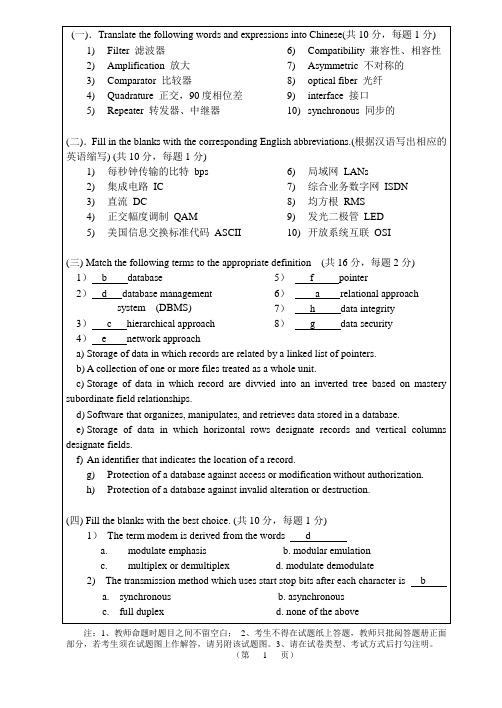
1)The term modem is derived from the wordsd
a.modulate emphasis b. modular emulation
c.multiplex or demultiplex d. modulate demodulate
f)An identifier that indicates the location of a record.
g)Protection of a database against access or modification without authorization.
h)Protection of a database against invalid alteration or destruction.
6)PC-to-PC networking could be easily accomplished between buildingsc.
a. on one campusb. between campuses
c. a or bd. none of them
7)In aaswitching system, a call was established and routed in a set of progressive electromechnical steps, each under the direct control of the user’s dialing pulse.
1)bdatabase
2)ddatabase management
system (DBMS)
- 1、下载文档前请自行甄别文档内容的完整性,平台不提供额外的编辑、内容补充、找答案等附加服务。
- 2、"仅部分预览"的文档,不可在线预览部分如存在完整性等问题,可反馈申请退款(可完整预览的文档不适用该条件!)。
- 3、如文档侵犯您的权益,请联系客服反馈,我们会尽快为您处理(人工客服工作时间:9:00-18:30)。
Unit 1 The Development of Electronics
Electronics is a part of the larger field of electricity. The basic principles of electricity are also common to electronics, Modern advances in the fields of computers, control systems, communications have a close relationship with electronics.
Electronics is a scientific study of electronic components such as electron tubes, diodes, transistors, integrated circuits and so on, electronic circuits and its applications. Electronics began in 1883, when Thomas Edison discovered the vacuum diode as part of his research on materials for a practical electric light. Edison’s discovery laid the foundation of electronics.
The development of electronics has had three important steps: the first step was electron tube invented by Fleming, an English physicist in 1904. This invention led the world to step into an electronic era. During that time the application of electron tubes was in the communication industry, first in radios and later in televisions. Because of their large size and wasted power, most of their applications are replaced by transistors today. The invention of transistor was the second step in electronics. A transistor was made from semiconductor material. The early transistors were made from germanium. The most visible application of transistors was in small, portable AM broadcast receivers. Silicon transistor began to replace germanium transistors in the late 1950s, which made possible the next revolutionary step in electronics. And the third step was the development of integrated circuits (ICs), which made a commercial success in electronics. Jack Kilby, an American scientist, made the first single chip IC in 1985, which laid foundation of microminiaturization and integration. The development of IC created microelectronics and brought a wide use of electronics in everyday items. It created the modern computer industry and restructured communications. Without it, man could not explore space or fly to the moon.
Electronic technology is developing rapidly in the world. And electronics industry is equipped to make yet another giant step forward.
翻译:1章:电子学的发展
1段:电子学是电学这个大领域中的一部分。
有关电学的基本原理也都常用于电子学中。
近代计算机、控制系统和通讯等方面的进展都与电子学有着密切的关系。
2段:电子学是研究电子器件(例如电子管、二极管、晶体管和集成电路等)电子电路及其应用的科学。
电子学始于1833年,即爱迪生在研究材料中发现真空二极管可以用作电灯的那一年。
爱迪生的发现奠定了电子学的基础。
3段:电子学的发展经历了三个重要的阶段:第一阶段是英国物理学家弗莱明于1904年发明了第一只电子管,这一发明标志着世界从此进入了电子时代。
该时期电子管应用于通讯行业,首先用于收音机,然后用于电视。
由于电子管体积大、功耗大,现在它的绝大部分用途已经被晶体管所取代。
晶体管的发明是电子学发展的第二阶段。
晶体管有半导体材料做成。
早期的晶体管用锗做成,主要用于小型袖珍调幅收音机。
硅晶体管于20世纪50年代末开始取代锗晶体管,它再次给电子学带来了革命性进步。
第三阶段是集成电路的发展,它给电子学带来了商业性的成就。
杰克科尔比,一个美国科学家,于1958年制造了第一个单片集成电路,为微型化和集成化奠定了基础。
集成电路的发展产生了微电子学,这使得电子学在日常事务中得到广泛应用。
长期以来,集成电路被视为信息时代最为重要的一项发明。
它开创了现代计算机工业,创建了通讯业。
没有它,人类就不可能探索宇宙或飞向月球。
4段:电子技术正在全世界飞速发展,电子工业也正以有一巨大的步伐向前迈进。
